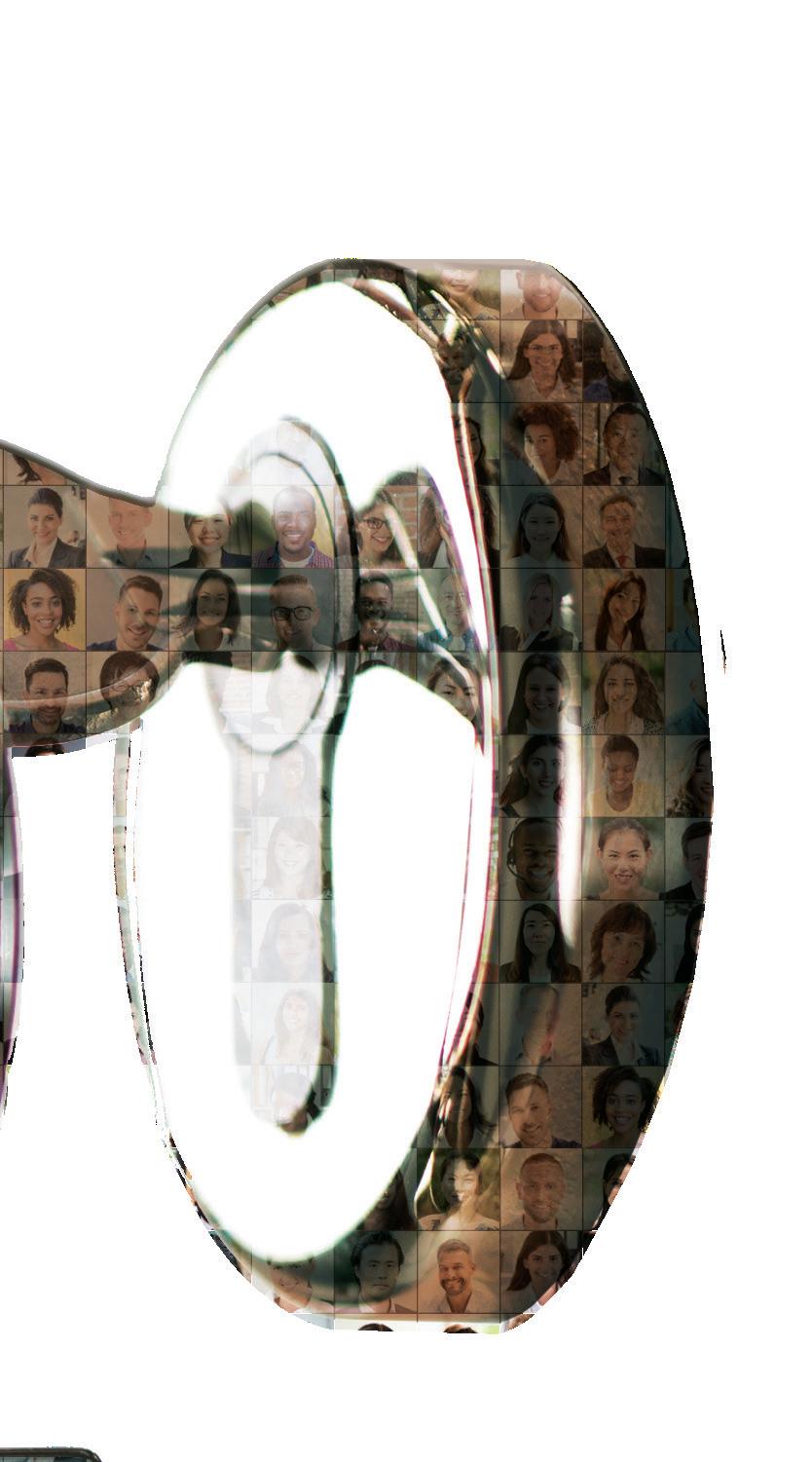Core Values




We’re committed to your everyday needs and your long-term goals.
With bankers who know your name and services that’ll make managing your finances a little easier, we’re here to support you through every stage of life. Find



Welcome to In Good Company, our new magazine that features the people and customers of United Community Bank.
We believe that the best part of who we are always goes back to the people who shape us. This magazine is a small sample of the largescale efforts of our bankers and clients who go the extra mile as you will read in some of the articles here.
The stories in this inaugural issue recount my goal for United to become a leadership development company disguised as a bank. We talk about how partnerships fit one of the bank’s core values of building relationships that will transform your company – and your life.
You’ll read about our Spring Leadership Conference, the reason behind it, the topics covered, and the importance of building leaders from the inside.
Other articles include interviews with Chief Investment Officer Philip Rich; Senior Vice President Clayton Summers, who leads Renewable Energy Finance with United’s Commercial Banking Solutions team; and a profile of the United
Community Bank Foundation, which helps organizations in the communities that we serve.
We are grateful for our customers across the Palmetto State, a few of whom shared their stories with us in this magazine. From a vast logistics company to a self-made female entrepreneur, each customer is unique, and each business is essential to United’s purpose of helping to build communities and improve financial well-being.
Finally, you’ll read about some of the employees who make the bank stand out. We often talk about our culture at United, but that wouldn’t be much of a story without the people who create it.
I hope you enjoy this new venture as much as I do, and I hope you’ll join me in exploring our banking industry and the unique business landscape of South Carolina – a place where I find we are truly In Good Company.

And please let us know what you think!
Thank you.
Lynn Harton, Chairman & CEO, United Community Bank

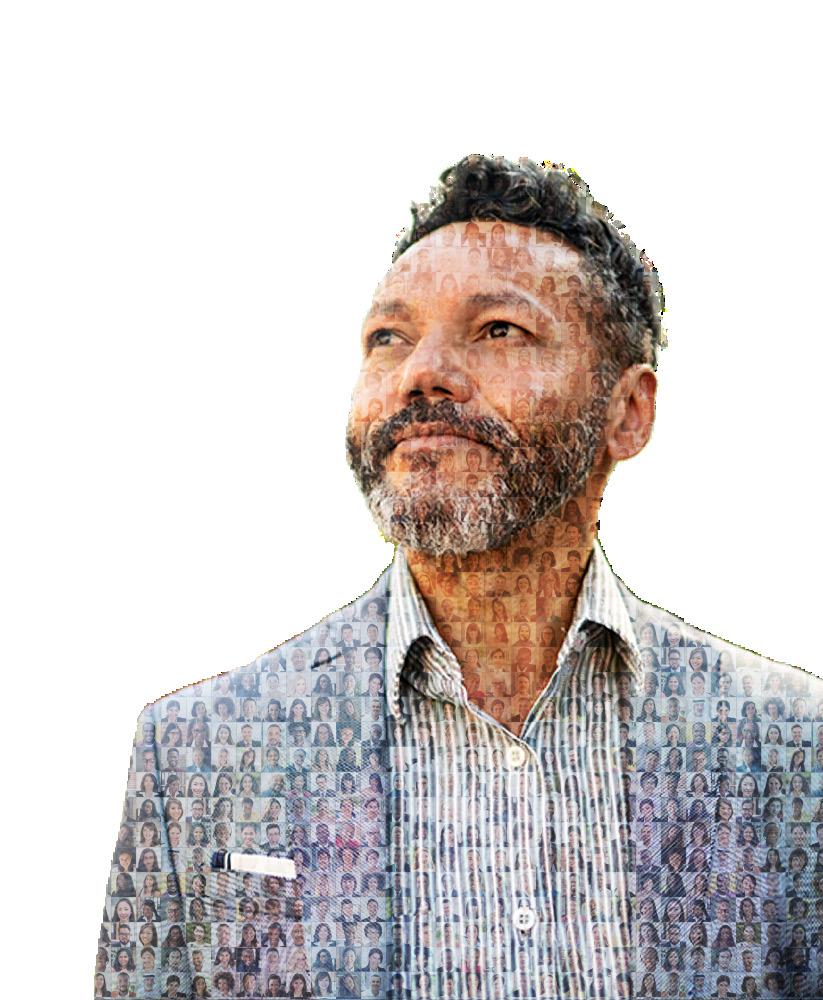
ENTREPRENEURIAL PROFILE
Expanding YMCA Sports Complex Brings
Added Benefits to Anderson County Residents
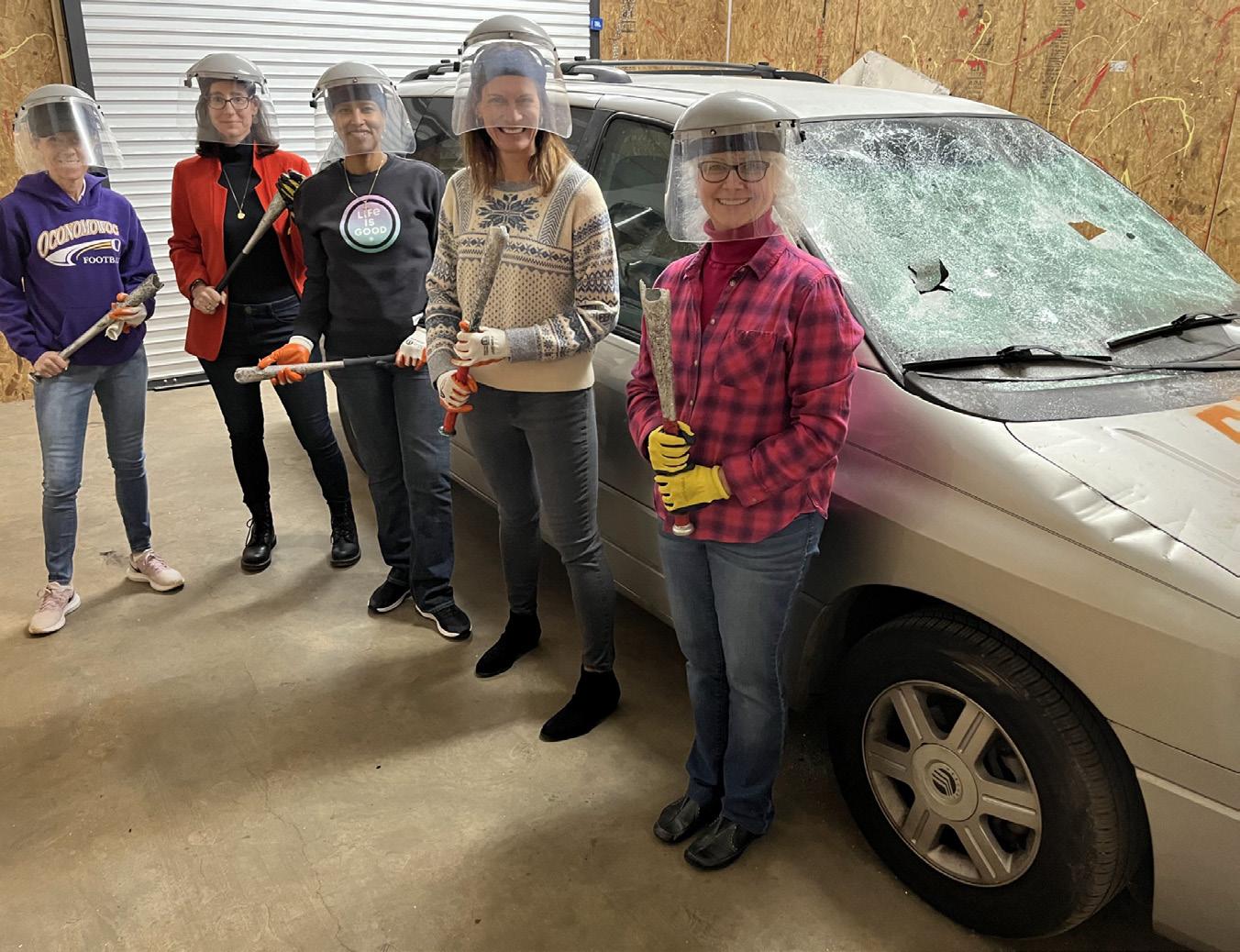
ENTREPRENEURIAL PROFILE
United Helps Medical Practice Grow From ‘Mom-and-Pop’ to Enterprise
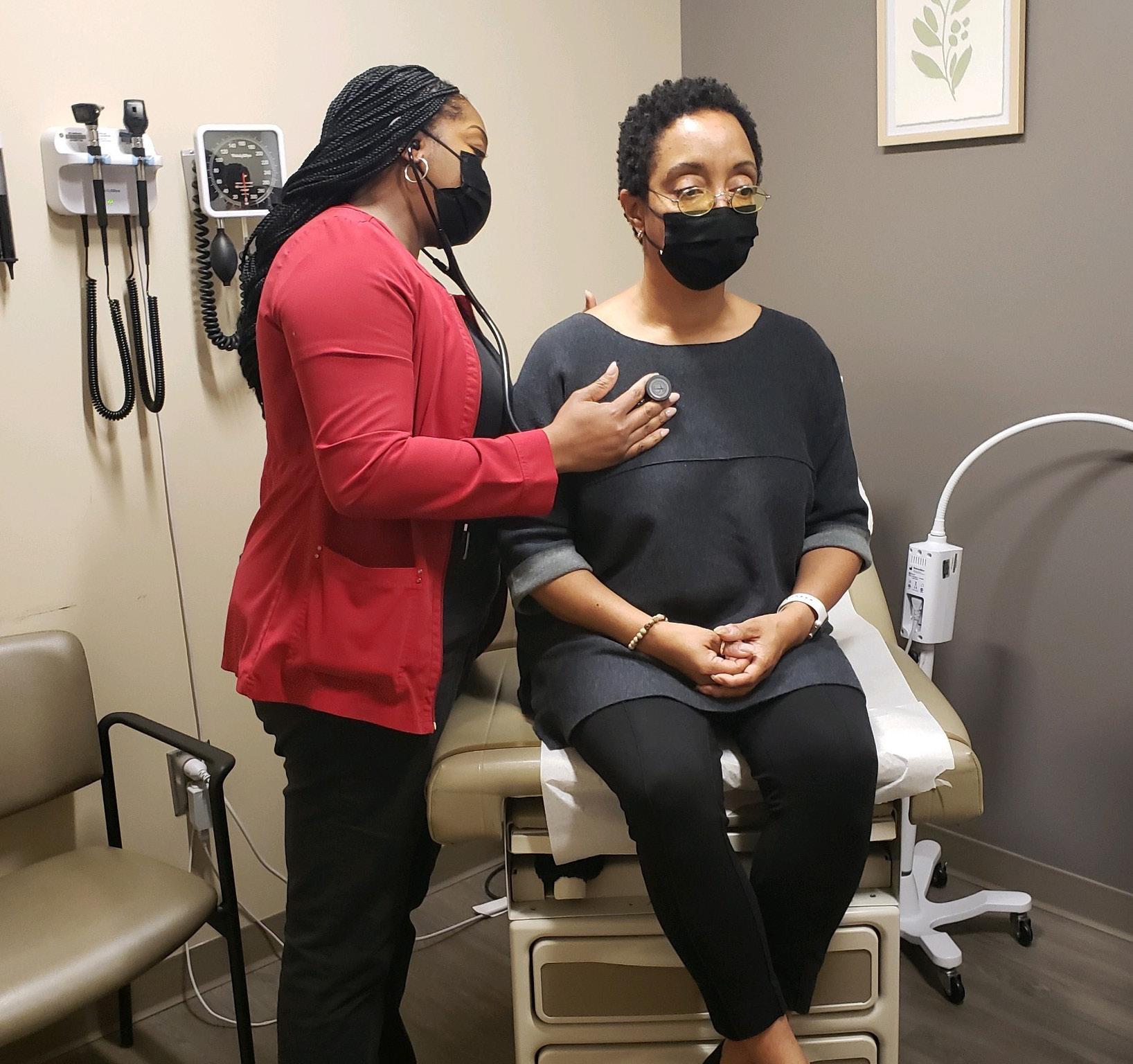
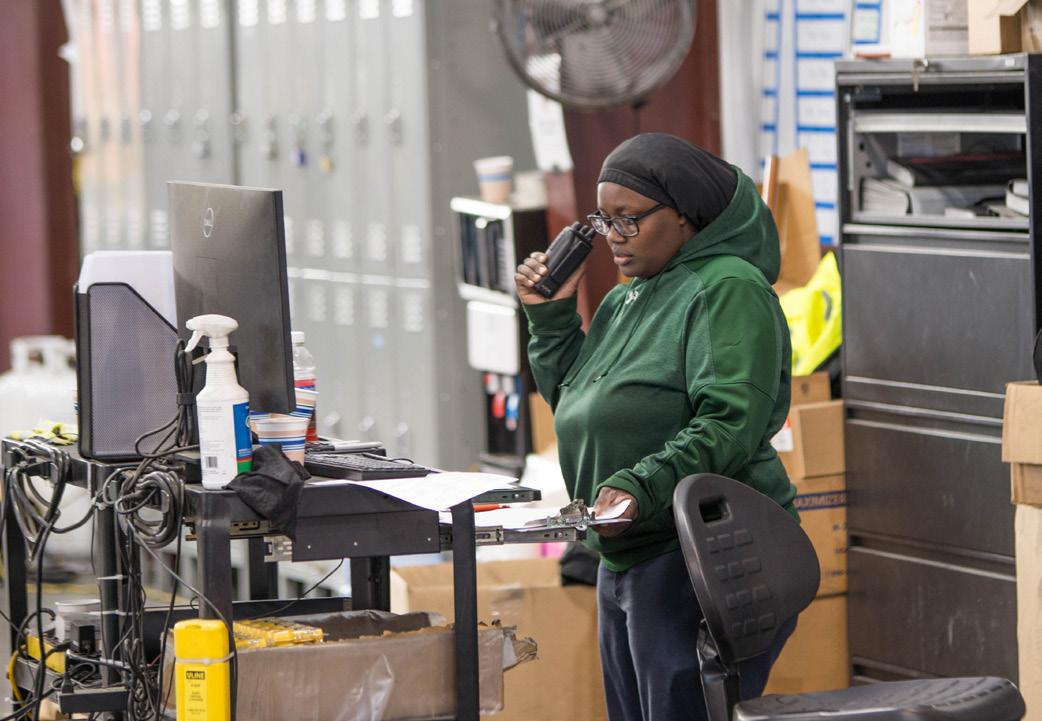
UNITED CULTURE
Author Jeff Henderson Shares Business Insights at Leadership Conference
EMPLOYEE PROFILE
Lisa Wiggins: Serving Unique Needs in a Community Like No Other
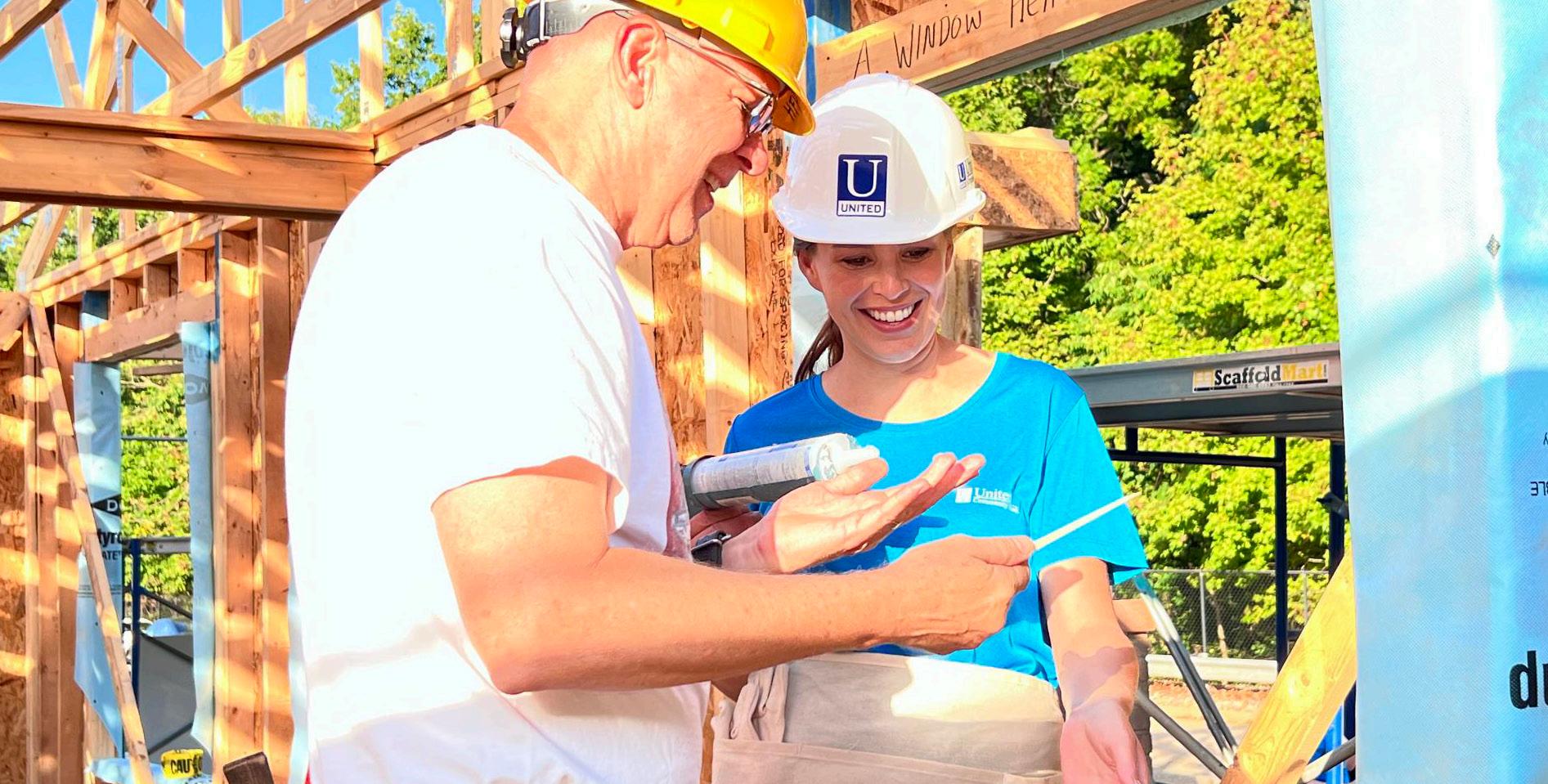
UNITED CULTURE
Renewable Energy on a Growth Path, Despite ‘Headwinds’
ENTREPRENEURIAL PROFILE
Canadian Logistics Company Brings
Advanced Systems to Port of Charleston
UNITED CULTURE
United Community Bank Foundation
Makes a Difference Improving the Financial Health of Local Communities
IT & SECURITY
How Secure is Your Password
EMPLOYEE PROFILE
Christie Manning: Managing for Growth Along South Carolina’s Coast
UNITED CULTURE
Leadership a Primary Objective at United Community Bank
UNITED CULTURE
Core Values Inform United’s Company Culture
p.36 p.38 p.40 p.42 p.44
UNITED CULTURE
Community Takes Center Stage at United Community Bank Leadership Conference

EMPLOYEE PROFILE
Michelle Brewer: A Passion for Community is a Good Match for Banking Career
UNITED CULTURE
United’s Chief Investment Officer Philip Rich Works With Clients to Develop Strategies
UNITED CULTURE
‘Capitalism is the Freedom to Try New Things’ United Community Bank CEO
Lynn Harton Shares Thoughts on Virtues of Capitalism
ENTREPRENEURIAL PROFILE
Growing This Business Was Child’s Play With United as a Partner
HOW
Produced by Integrated Media Publishing
Publisher | Lori Coon
Vice President of Business Development | Michael Evans
Editor | David Dykes
Associate Editor | Donna Isbell Walker
Writers | John C. Stevenson, Licia Jackson
Photographer | Tim Ford of Power Suit Portraits
Project Manager | Vicki Holinko
Designer | Jasmine Shull Printed

When it comes to providing for Anderson County residents, the Anderson Area YMCA boasts a long list of accomplishments. The 501(c)(3) agency, chartered in 1949, leverages a $5.1 million budget to serve its 10,600 members. The Y offers programs including youth sports, child development, aquatics, and wellness activities, in addition to its member services.
Some of its programming includes after-school enrichment programs for students in Anderson school districts 3, 4, and 5, serving around 550 children daily during the school year, according to Joe Drennon, the agency’s CEO. When school’s out, the YMCA is still there, offering day camps for the same constituency. The aquatics program currently has around 110 swimmers participating on swim teams, and in addition offers water aerobics classes and swimming lessons. The center’s wellness program focuses on all ages, from kids to senior citizens.
As laudable as those accomplishments might sound, the YMCA’s leadership isn’t resting on its substantial laurels. A newly expanded sports complex, which originally opened in the early 1970s, will serve both youth and adult sports with five multipurpose fields, a baseball complex and, in cooperation with Anderson School District 5, a cross-country course to serve as the home turf for both T.L. Hanna and Westside high schools.
The agency depends, in part, on the support of gifts from the community it serves, and these gifts have helped in a large way – literally – to make the expanded sports complex a reality.
“Prior to the expansion and renovation, we were programming on 30 acres at the sports complex,” Drennon explained in a recent interview. “Through the gifts of the John Tucker family, we’ve gotten an additional 55 acres, so we will be programming on about 84 acres out at our new sports complex.”
Much of the funding for the expansion and renovations came from what Drennon described as an “independent capital fundraising drive,” which was complemented by the school district’s contribution for the crosscountry course.
The Y’s fundraising drive, while successful, did come with a caveat that Drennon said could have slowed progress on the anticipated slate of renovations and improvements.
“In our capital campaign we have five-year pledges, and what we asked United to do is to help us with funding against those five-year pledges, to offset current amounts that are due on the construction process, versus those that are pledged over a five-year period,” Drennon explained, which resulted in an accelerated construction program.
Drennon said the project is currently in its final phases: “We’re hoping the contractor will turn the facility over to us in May or June and we will start programming in the fall of this year.”
Once completed, the upgraded complex will not only provide improved services and opportunities for area residents, it will also potentially draw statewide attention.
“I think the thing that will make us different is our partnership with the local school district
on this cross-country course,” he said. “Certainly the YMCA will use the sports complex for our yearly programming we do in soccer, football, baseball – and we’re starting with lacrosse – and we’ll also offer weekend tournaments in each of those groups.
“But the cross-country course will allow us to try to attract state championships for all classifications, and we’ll also try to attract a regional cross-country league, and we also have the flexibility to offer college meets.”

He added that one of the first cross-country meets will host Anderson University among its field of participants.
“I look for it to be a huge economic generator for economic growth in Anderson County by hosting these regional tournaments and out-oftown and regional meets,” Drennon said.
Drennon praised United for its partnership with the Anderson Area YMCA, and noted the relationship goes much deeper than most collaborations between a bank and its customers.
“Our business relationship with United goes back several years,” Drennon said. “They are very community-oriented. Their local executive (United Regional President Rick Stanland) serves on our board of directors, and we have done various things with them throughout the years, but this partnership took place beginning two years ago. And not only are they providing the loan for us to hedge against the pledges, but they have been a major contributor to the complex itself, through donations.” •
A dream of independence hatched almost a quarter-century ago has blossomed into the largest independent primary physicians care service in South Carolina.
Palmetto Primary Care Physicians was the brainchild of nine Charleston-area physicians who joined together around 24 years ago to create an LLC that would offer area residents an alternative to the local hospital system for a variety of services, including primary care, according to Terry Cunningham, PPCP’s CEO.
Today, PPCP boasts 42 sites across the Palmetto State with 135 care providers who serve around 250,000 active patients, Cunningham noted. The business has also expanded its offerings to include five specialty practices, a complete diagnostic center, and five physical therapy centers.
“That’s really our story,” Cunningham said. “We went from nine physicians with 24 employees to 135 providers and 727 employees.”
It’s one thing to grow a business, another thing altogether to sustain that growth. That’s where Cunningham, a veteran of the health care industry, says he came into the PPCP story.
“I came into PPCP almost seven years ago,” he explained. “They were on the cusp of trying to figure out how they wanted to maintain sustainability in the market. Our enterprise is not a hospital system, so our ability to go out and finance things comes from local banks.
“When I came in, PPCP really needed someone who understood the business and had the acumen to grow a ‘mom-and-pop’ business into an enterprise,” he added. “When I got here, PPCP had acquired quite a bit of debt, and we needed some way to mitigate that debt.”
As an integral part of Cunningham’s growth strategy, he led PPCP into a successful working relationship with United Community Bank. In the beginning, the relationship was about taking a calculated chance – on both sides.
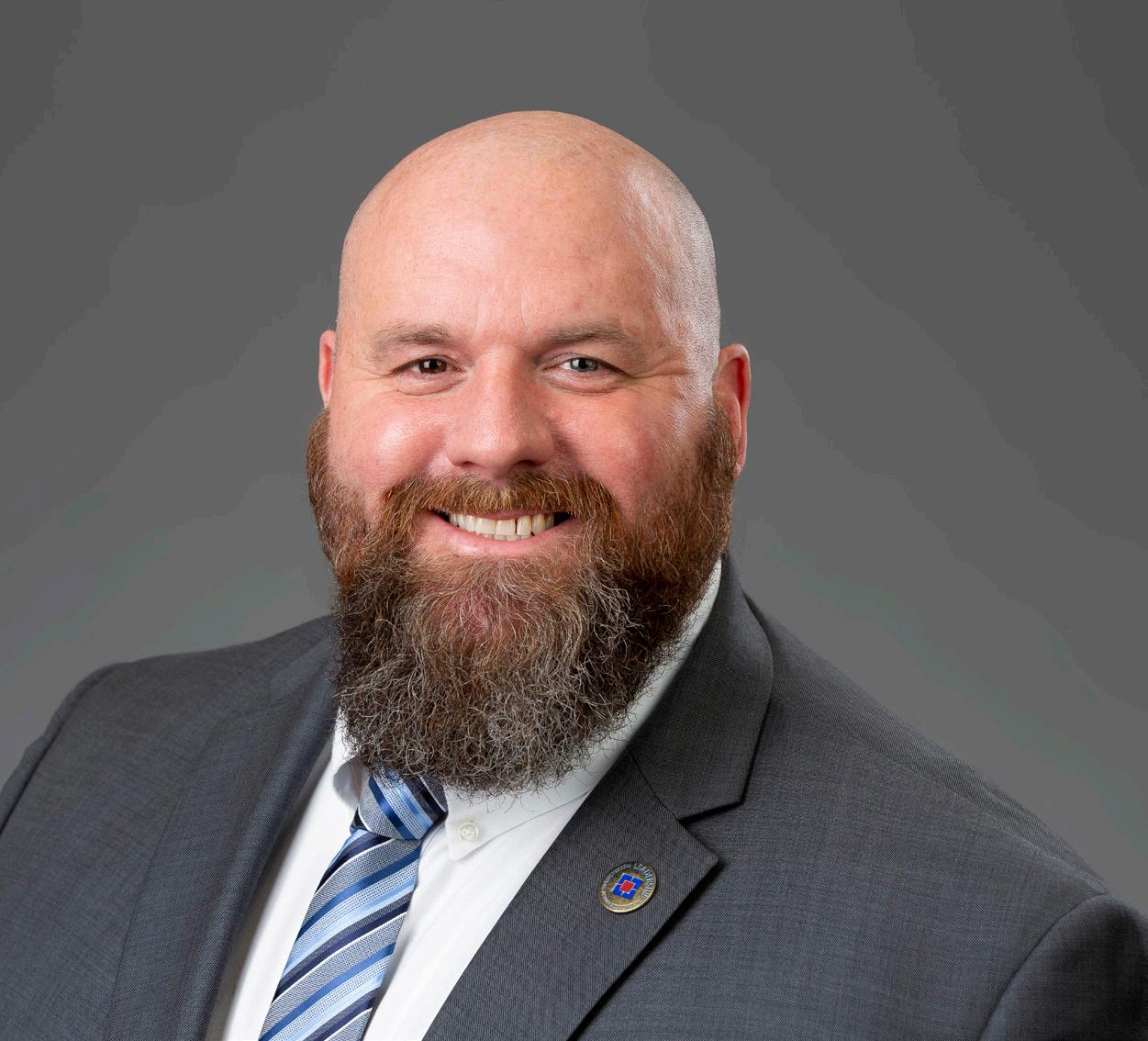
“Palmetto had used (another bank), and when I came into the organization, I wanted to get fresh eyes on things,” Cunningham said. “United had just started coming into the South Carolina market, and I met with Tom Kutyla and Casey Brogdon. I was looking for an opportunity and I think they were looking for an opportunity too, for them to work with a large employer and make a footprint for themselves in South Carolina. For me, I was looking for someone who had the tools and the skills set to consolidate debt for our organization.
“When we first started talking, I think the vision of the bank aligned with what we were trying to do strategically, so we moved away from two banks that Palmetto had been with for over 15 years and went with United,” he continued. “We took a chance on them and they took a chance on us.”
The bank partnered with Palmetto to help the business consolidate more than $7.5 million in debt. The bank “rolled it into a line of credit,” Cunningham said. “If it wasn’t for that, and having the ability to increase my cash flow –they really helped us out of a tight spot.”
Beyond that, however, Cunningham credits United with helping improve Palmetto’s overall efficiency, giving PPCP providers the ability to offer top-quality care to more and more patients. As an example, Cunningham mentioned how United helped Palmetto streamline just one banking activity.

United helped Palmetto with “going to consolidated lock boxes and having processes in place for deposits and stuff like that,” Cunningham said. “As a mom-and-pop shop, Palmetto wasn’t doing processes all that well, and having United come in with their expertise on that really changed our workflow and processing the volume of patients.
“I really feel like they helped us out tremendously, and they didn’t really have to. But it’s paid off for us and it’s paid off for them. We’re now a debt-free company,” he concluded.
Cunningham said he looks forward to continuing the business’s relationship with United as Palmetto continues to grow. The
medical provider has plans to expand its offerings into both Georgia and North Carolina in the next several years. It’s a future that certainly seems to present a multitude of opportunities for both PPCP and United.
“They’ve been a good partner to us,” Cunningham said of the bank. •

After a long career in both marketing and ministry, Jeff Henderson has seen what works and what doesn’t work in business.
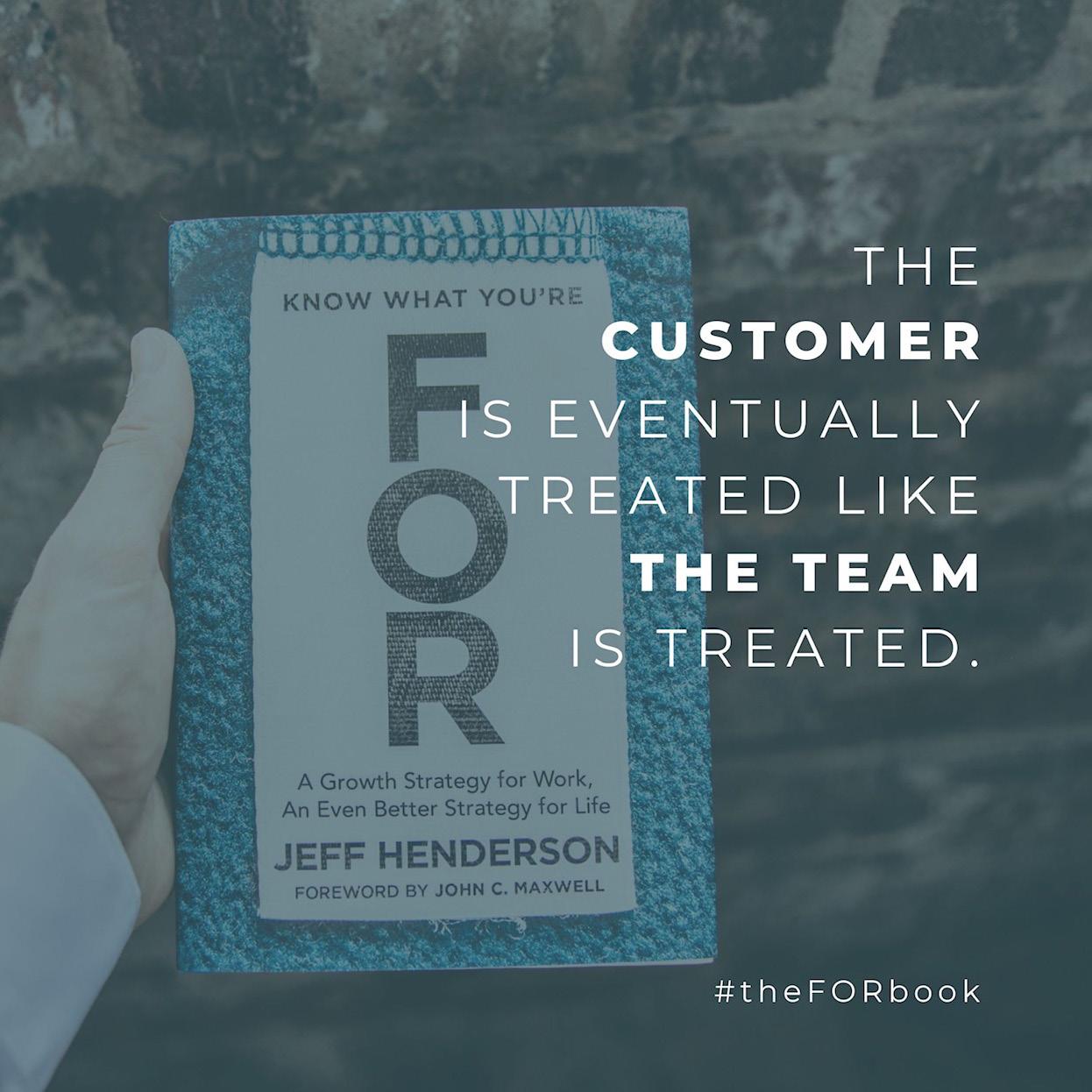
Henderson, the author of “What Are You FOR?” spoke at United Community Bank’s Senior Leadership Conference on March 16, sharing insights he learned while working for Chick Fil A.
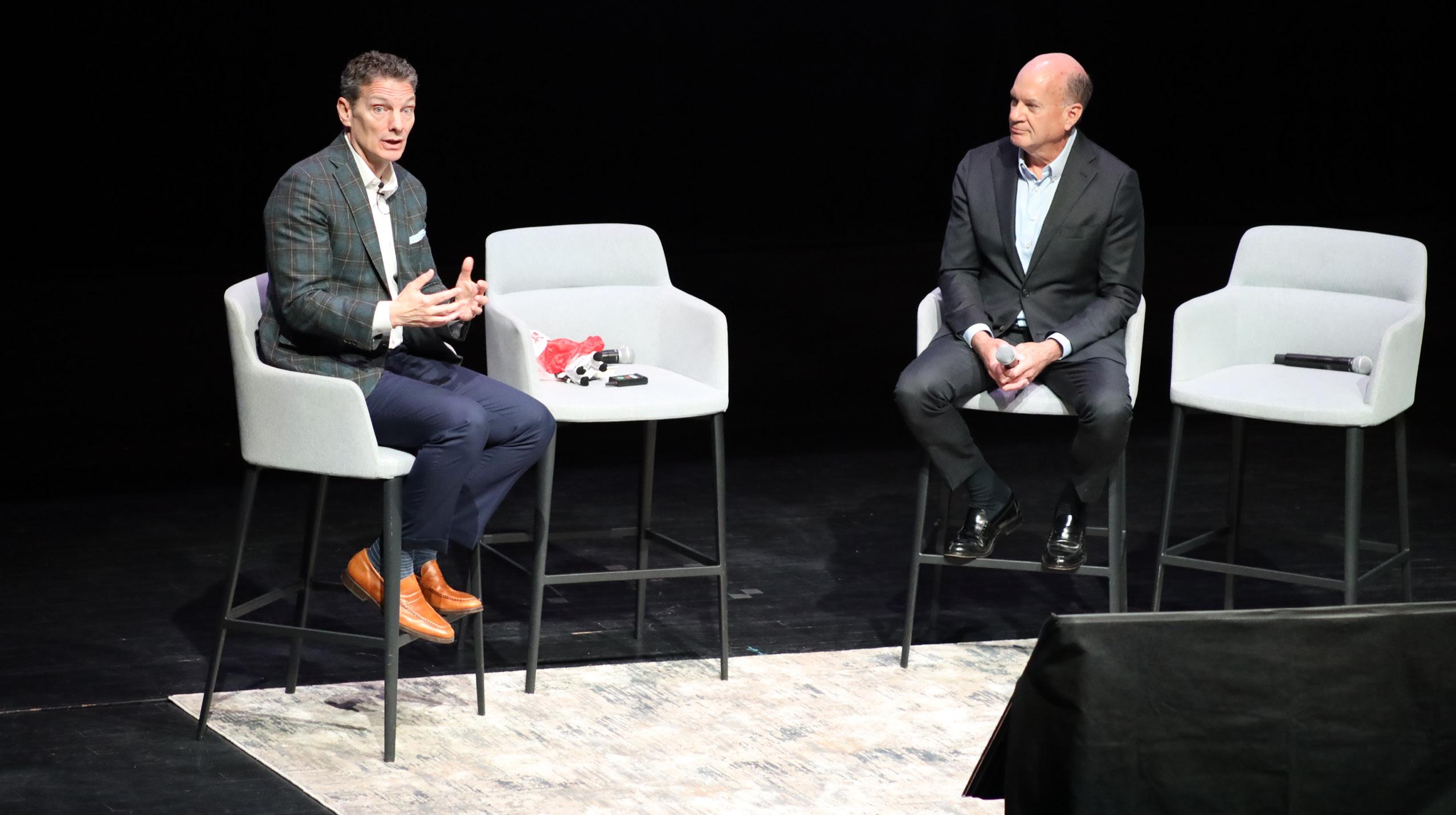
“Purpose fuels profit,” Henderson told the audience. “How you view life determines how you do life. Who are we playing for, and what are we playing for?”
Successful companies are those whose customers become “vision carriers” for their products and mission, and businesses have learned over the years that positive word-ofmouth advertising is some of the best feedback a company can receive.
To that end, “a business is what customers tell other customers it is,” he said.
Every company has to decide what it wants to be known for, and that can’t be a “17-page mission statement” that’s written and then forgotten.
“Leaders are repeaters. You have to say it over and over,” he said.
The two important questions for businesses are: What do you want to be known for, and what are you known for? The second question, Henderson said, belongs to the customer.
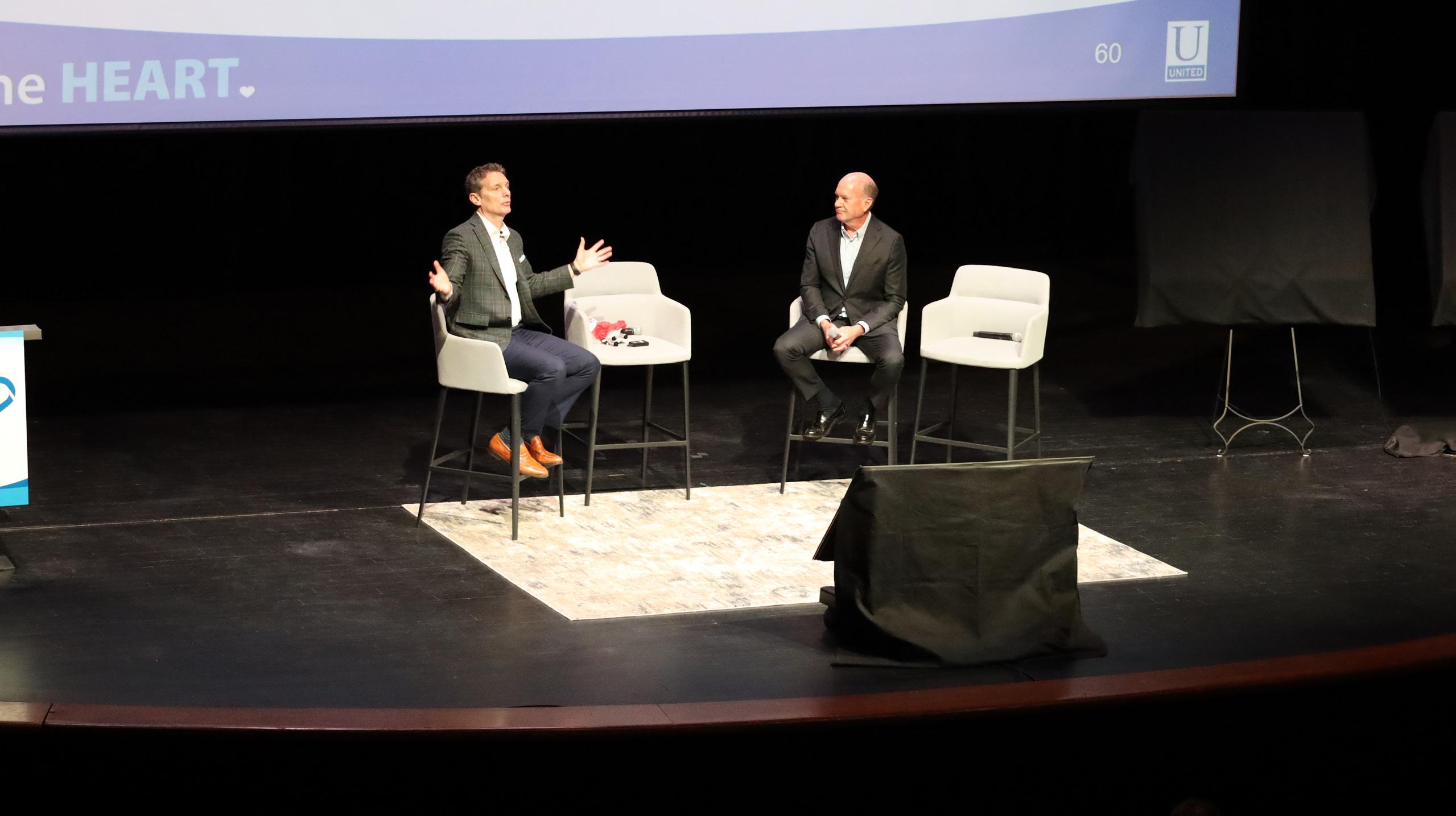
“It’s their opportunity reflect back to the people they do business with about whether they’re delivering on question No. 1. When the answers match, you’ve created vision carriers. They will tell their friends about you and how much you can add to their friend’s life.”
Listening to the customer seems like a logical way to succeed in business, but “it takes courage” to do that, Henderson said.
And treating the customer well actually starts with treating employees well. Henderson shared his five-step approach to building a cohesive, loyal team:
1. Believe abundantly
2. Appreciate consistently
3. Develop intentionally
4. Listen actively
5. Live repeatedly
“Your culture is determined by default or design,” he said. “People who feel valued will do more.”
It’s up to each team member to remain inspired to do their best for the company, Henderson said.
“The best gift you can give your business is a healthy, inspired you,” he said. •
YOUR CULTURE IS DETERMINED BY DEFAULT OR DESIGN,” HE SAID. “PEOPLE WHO FEEL VALUED WILL DO MORE
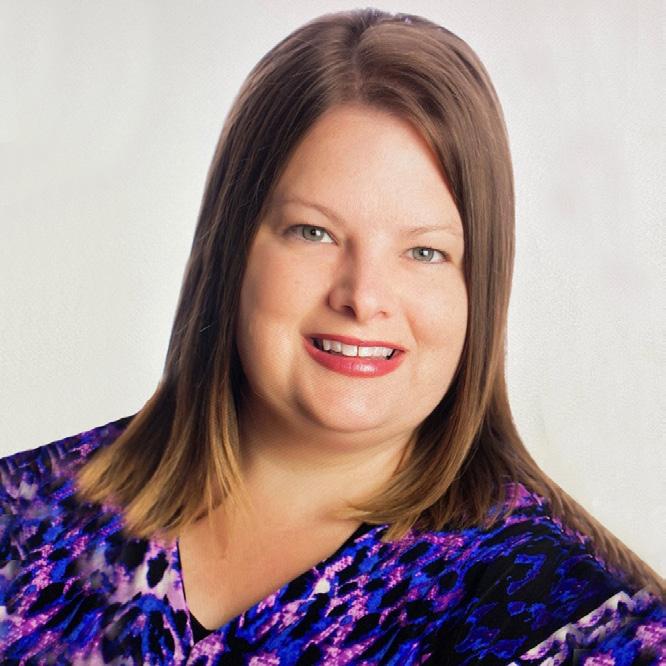 By Licia Jackson
By Licia Jackson
For Lisa Wiggins, her banking job and her role as a community leader are inseparable. Lisa is the Vice President and Manager of the United Community Bank branch that sits just off the Eastern Band of Cherokees Indian Reservation in beautiful Cherokee, North Carolina. The area boasts the Great Smoky Mountain National Park and Blue Ridge Parkway featuring hiking, waterfalls, kayaking and even elk watching.
“This bank was built to serve the Cherokee people and the nearby community of Whittier,” explains Wiggins, who has been with the branch since 1999, the year it opened. “We serve unique needs. Cherokee is a federally recognized Indian Tribe and a sovereign nation with its own President and Congress — a Chief and Tribal Council.”
“United’s customer base in the area is also distinctive”, Wiggins says. The main employer in Jackson County is Cherokee Harrah’s Cherokee Casino and Resort, which has been in operation since 1997. Businesses in the area include restaurants, hotels, craft stores, candy shops, clothing stores and campgrounds to name a few.
The bank provides business and mortgage loans, business and personal accounts, credit cards, treasury management, credit card
processing and advisory services. Extending its reach into the community, United is a part of the Cherokee Chamber of Commerce and the Eastern Band of Cherokees Community Foundation. Wiggins, who is Secretary of the Board of the Cherokee Foundation, says, “We serve the community by issuing grants to nonprofits to meet the needs of the Cherokee community.”
The Eastern Band of Cherokees Community Foundation is a part of the North Carolina Community Foundation. The Foundation funds scholarships for the education of enrolled members and provides funds to meet needs in the community. They have also supported Reach Out and Read, which provides free books to children that are gifted by their doctors when attending their appointments. Wiggins has served on the Foundation’s Board for seven years. “It has been fun and educational,” she says. “I have learned how a productive Board operates. Our input is important, and being involved in helping the community gives me a sense of satisfaction. We are currently raising money for our unrestricted endowment, even though it has started out small, every penny matters.”
Another major source of community assistance is through United Community Bank’s own Together for Good Foundation, which provides funding throughout the area the bank serves.
“In Cherokee, the Foundation donates money to many nonprofit organizations, such as the fire
department, rescue squad, pet care, veteran care and financial literacy education”, Wiggins says.
“The bank’s foundation has Five Good Days during the year, each focusing on a specific need”, Wiggins explains. These days consist of Martin Luther King Day in January, Financial Literacy Month in April, National Day of Service in September, World Animal Day in October, and Veterans Day in November. Bank employees work to find deserving groups to receive funding.
“The Cherokee branch has noticed a significant need for financial literacy, especially the younger generation”, Wiggins says. “The younger members of the Cherokee tribe receive funds that are invested for them until they reach a certain age, then they begin to receive installments over time until the funds are disbursed.”
“We advise them to make education a priority and to invest their money in a home, as well as save a portion of the money in an emergency fund”, says Wiggins.
The bank employees visit the schools and teach financial literacy and the importance of saving. “We explain the difference between needs versus wants, how to write a check and balance a checkbook. United has a lesson plan, we give them piggy banks and we try to make it fun,” she says.
As a matter of fact, Wiggins went to college with the goal of being an English teacher before going into banking. Nevertheless, she finds herself using her teaching degree, both in the financial literacy program and in the bank, where she trains other bankers. If customers come in needing help with their checkbook, she is happy to sit down and help them.
“One of the reasons I like to help people is that my mom and dad live 2½ hours away. I depend on other people to help them. That motivates me.” Wiggins says. She gives credit to her parents who are responsible for her work ethic and faith; they always required her to work for things she wanted, including her college education and a conviction to do things the right way.
Before the Covid pandemic, Wiggins and her fellow employees served the community in other ways, from working with the Eastern Band of Cherokee Indians to distribute and install infant car seats to supporting the Cherokee Cancer Support Group. For two years, Wiggins took a week of vacation each year to volunteer at the Hope Lodge owned by the American Cancer Society in Greenville, North Carolina and helped sanitize, answer the phones, prepare and serve meals. Now that activities have returned to normal, she is planning to take part in Pledge the Pink, a three-day walk in October to raise money for breast cancer research. She will walk 33.1 miles with a friend who is a five-year breast cancer survivor.
At the bank, she stresses personalized customer service to make everyone feel comfortable and valued. “We want people to feel they are able to talk with us about their needs. We ask questions and gain their trust so we can find out how we can best serve them.”
The Cherokee branch has seven employees. Wiggins believes as a leader she must be there for them; if the tellers arrive at 8:15 a.m., she will be there too, and stay late if it takes a while to balance the day’s transactions.
Wiggins says the two great leaders, John Goins and Ann Marie Harris, inspire her. “They don’t ask you to do anything they aren’t doing or haven’t already done.” Serving the customer and the community is a major part of the culture at United Community Bank, whose creed reads, “Because the customer has a need, we have a job to do.”
For Wiggins and United Community Bank, their legacy and the imprint they leave behind is important. “We strive to be the best we can be and make every effort to be impactful in our community not only now, but for years to come.” •
Participants at the Southeast Renewable Energy Summit Nov. 30-Dec. 2, 2022, at the Omni Charlotte Hotel learned how, over the past year, legislation, regulatory decisions, and both utility and corporate procurements have opened new opportunities to develop renewables.
More than 450 regulators, utility executives, energy developers, financiers, and other participants joined the insightful event. It was an opportunity to network with and learn from key decision makers, leading players, and peers about the challenges and opportunities of renewable energy development in the remarkably active market.
Topics of panel discussions included the Southeast renewables policy and regulatory
landscape, overcoming solar panel and battery supply and production challenges, utilities’ carbon-free goals and their plans for renewable procurement, holistic transmission and renewable energy planning for Southeast renewable energy projects, increased cost and market risks in corporate procurements, energy storage in the Southeast, and the changing dynamics of renewable energy development.
Other topics included growth of offshore wind in the Southeast, platform deals and the M&A market in the Southeast, and perspectives on Southeast renewable energy project financing.
Clayton Summers, Renewable Energy Finance Team Lead/Senior Vice President at Greenville, South Carolina-based United Community Bank, attended. He leads the Renewable Energy Finance group for United that is focused on delivering financing solutions for renewable energy projects across the United States.
His main takeaways from the summit were the size and scale of how the industry has grown, the value of the session discussions, notations of the increasing levels of M&A activity, the significant stimulus being injected into the industry through the passage of the Inflation Reduction Act of 2022, and the amount of capital coming into the industry, including from foreign investors. “Investors are looking for pipeline. They’re also looking for strategic longer-term partnerships,” he said.
“For 2023, we still expect traditional tax equity structures to be the significant part of that capital stack,” he added. “Over time, though, with the transferability of tax credits, the thought is that that’ll really help democratize that part of the capital stack for smaller, midsize developers and other groups that can now look to own projects.”
“The industry itself had some headwinds last year,” Summers said.
But he added, “I saw people at that conference that I haven’t seen at the previous Southeast conferences before. And that’s because of the significant interest and opportunity for the industry..”
His job, he says, is to identify and build relationships with sponsors and developers involved in the renewable energy industry “so that we can help play a role in the long-term financing of projects.”
He’s in charge of client selection and identifying opportunities that can be brought through the credit process. Once approved, United closes on those transactions.
With more large companies setting cleanenergy goals, revenue agreements for the energy are being structured in various ways to enable companies to meet these goals, which provides United opportunities to finance these projects, Summers said.

“We see those large companies’ goals being translated into projects that come across our desk,” he said.
Last year, the combination of rising interest rates, increased supply-chain costs, and the announcement of the U.S. Department of Commerce’s investigation of claims that Chinese manufacturers were working with solar manufacturers in Southeast Asian countries to sidestep AD/CV duties negatively impacted the U.S. solar industry during the first half of the year, Summers said.
Reuters subsequently reported President Joe Biden waived tariffs on solar panels from four Southeast Asian nations for two years and invoked the Defense Production Act to spur solar panel manufacturing at home. The two-year moratorium of potential solar tariffs coupled with the passage and signing into law of the Inflation Reduction Act of 2022 provided a significant boost to the industry.
Summers said United focuses on financing projects that use proven technology with highquality components.
He salutes United’s leadership, credit, treasury, and service teams, and said success is due to how United separates itself from other lenders by listening to clients, understanding their needs, and crafting solutions.
“Our role as a banker is really to understand the who, what, where, why of the project and then to structure the financing that with credit approval makes sense,” he said. •
 By John C. Stevenson | Photos by Tim Ford/Power Suit Portraits
By John C. Stevenson | Photos by Tim Ford/Power Suit Portraits

Montreal-based Ray-Mont Logistics has established a presence at the Port of Charleston in 2021, bringing its unique, cutting-edge cargo-management systems to provide an integrated logistics solutions to various commodity shippers using one of the East Coast’s busiest ports, according to Jonathan Hébert, Ray-Mont’s vice president, finance and corporate development.
Hébert described Ray-Mont Logistics as a “waterborne trade enabler” that works to connect a wide range of rail freight commodity shippers in North America to overseas markets. That freight can comprise everything from forest products to petrochemicals, and more.
Based on longstanding strategic relationships with key supply-chain partners, such as class-1 railroads, short lines, steamship lines, the thirdparty truckers, and port authorities, Ray-Mont has been able to achieve immediate success in Charleston.
The company, which recently celebrated its 30th anniversary, utilizes what Hébert described
as a “unique” business model. He explained that traditional shipping methods involve unloading railcars into warehouses, or “places of rest.” From the warehouses, the goods must then be re-transferred to ocean containers, and then loaded onto the ships. Hébert described this traditional method as “double-handling.”
By contrast, at Ray-Mont, “we have a very special ‘recipe’: we unload directly into containers in a just-in-time fashion by putting them directly on the ground via different cargo-handling and packaging methods,” Hébert said.
The Ray-Mont system both streamlines the process and eliminates the need for additional,

and expensive, equipment. The end result? “We unload faster and reduce bottlenecks,” Hébert said, both of which are critical elements in today’s shipping world.
That also fits well with the Ray-Mont system, which, according to Hébert, relies on the use of advanced IT systems, machine learning, and predictive analysis, so that, as Hébert put it, “helps gain a better control on the supply chain, improving velocity and fluidity of exported commodities.”
As it turns out, a manufacturer in the Southeast was looking for a logistics company that had just such a suite of progressive logistics solutions to meet its needs.
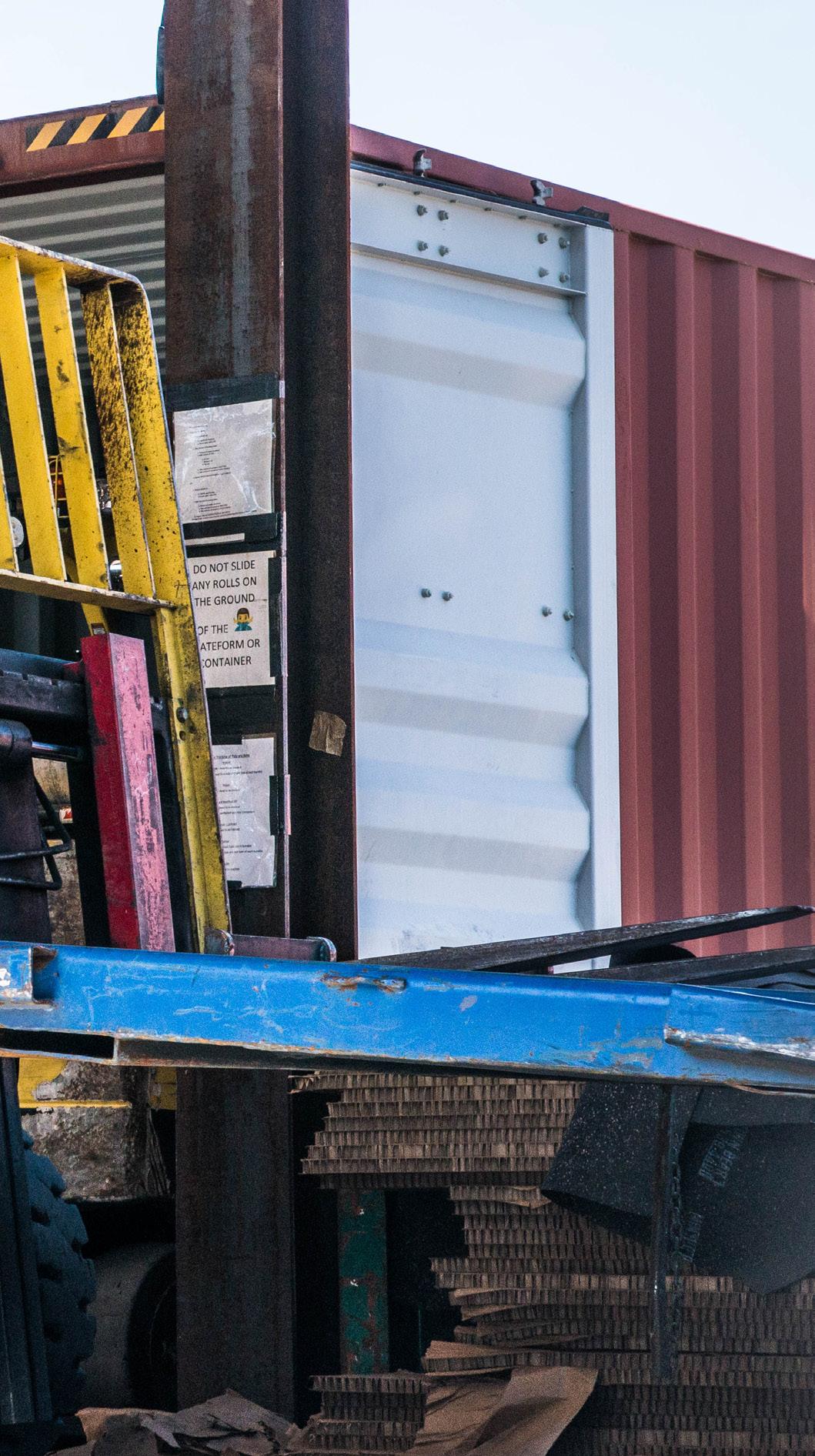


“We were put in contact with (Charleston) port authorities by some shippers that wanted a presence in Charleston, and they wanted very specific, forward-looking, and very innovative (logistics) services,” Hébert explained.

To pull it all together, RayMont needed a stateside financial partner that was equally innovative. That’s where United came into the picture.
“We’ve been very, very impressed with the level of service, the creativity, the willingness to close a deal, the understanding of our industry, and that United is solution-oriented to various financial instruments,” Hébert said. “Honestly, it’s one of the best openings to a banking relationship that we’ve had in 30 years.”
Hébert said his primary contact with the bank has been Scott Garcia, a senior vice president located in Mount Pleasant: “Scott is my go-to guy,” he added.
“Put yourself in our shoes: You are a Canadian corporation looking at the U.S., as a pretty big market opportunity, and Scott and his whole team at United were phenomenal,” he added.

And while Ray-Mont has solid working relationships with banks in Canada, Hébert said United’s level of client service has earned the South Carolina-based bank the opportunity to grow the partnership between the two businesses.
“Banking is a commodity, but how you differentiate your bank offering is through people,” Hébert said. “And Scott has been pivotal for the financing we’ve done in Charleston, and for the future projects we’re looking to expand into in the Southeast U.S.” •
BANKING IS A COMMODITY, BUT HOW YOU DIFFERENTIATE YOUR BANK OFFERING IS THROUGH PEOPLE

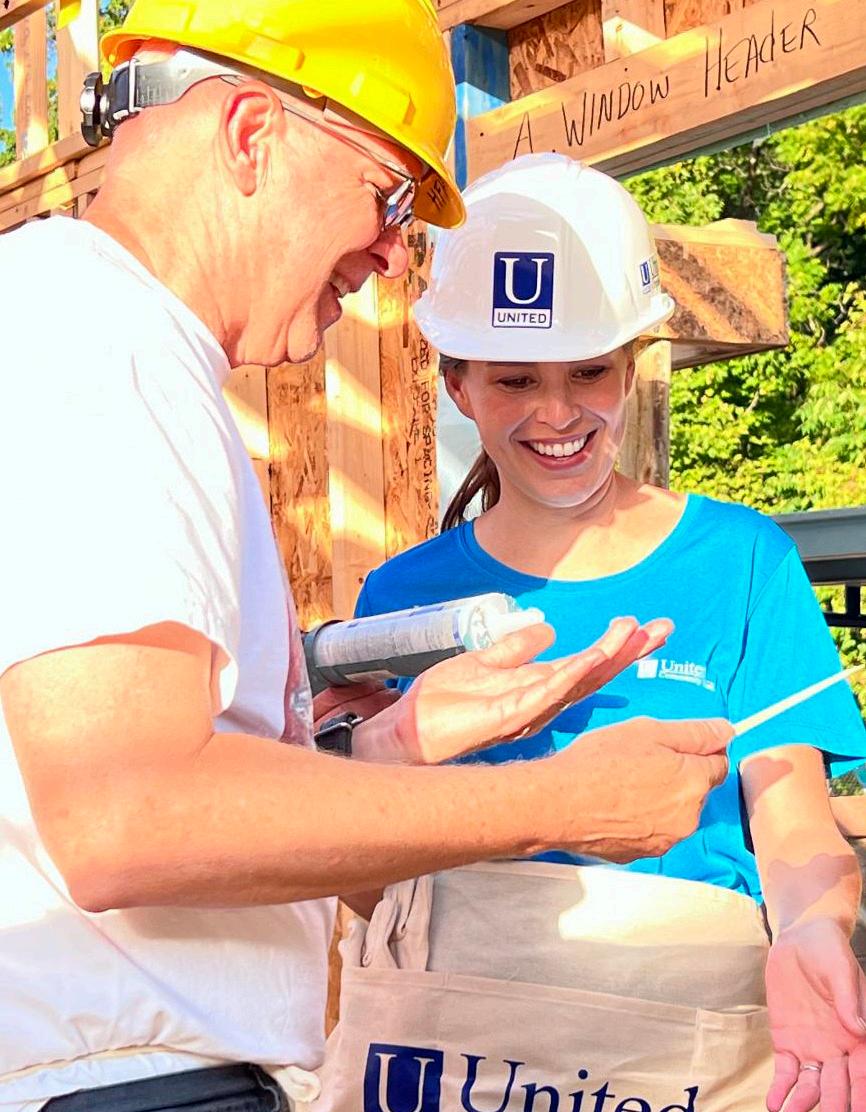
United Community Bank’s philosophy on banking is evident in its middle name – the word “community” is key to how bank leaders see the company’s role.
That means the bank does more than make loans and provide financial services to accountholders.
The United Community Bank Foundation is designed to improve the financial health of the local communities it serves by supporting nonprofit organizations where teammates volunteer. The foundation, which came together in 2020 with an initial $10 million endowment, focuses on four pillars: economic empowerment, youth development, housing strategies, and the arts.
Moryah Jackson, senior vice president of community development and engagement for United, began working for the bank in 2020, at the height of the pandemic. During that time of upheaval, when so many individuals and businesses were struggling to maintain their financial equilibrium, the bank made the decision to create the foundation.
“During the pandemic, banks were helping businesses stay afloat, and PPP (Paycheck Protection Program) was there,” Jackson said. “Our leadership team doubled down on their commitment to the community, and so one of the things that they did was start a foundation. We started the foundation with a percentage of the revenue that we earned from PPP. I thought this was a wonderful way to give back to the community, and I think that spoke volumes about the bank.”
United’s tagline is, “The bank that service built,” and the foundation is a way to demonstrate its commitment to that belief.
“We want to improve the financial health of the local communities that we serve, and so our foundation focuses on that,” Jackson said.
Before starting the foundation, the bank surveyed employees to get a sense of how each banker was involved in his or her community and the ways in which the bankers thought the community could benefit from United’s involvement.
Through the survey, the bank identified the four pillars on which the foundation would focus.
“We felt that all four of those contribute to financial health in local communities, and those are ways in which our local bankers are involved in giving back,” Jackson said. “As you can imagine, our bankers are volunteering with organizations that are focused on solving some long-term issues and challenges in communities. It takes money to address those issues, but it’s not always about money. Sometimes it’s about investing time, using your expertise, building partnerships and collaborations. What I like about our foundation is that our bankers are already volunteering, and we’re amplifying their efforts by making a financial contribution.”
The way the foundation works is that an individual banker will apply for funding for the organization with which he or she volunteers, the foundation board reviews the applications and decides which applications will receive funding, Jackson said. The organizations themselves are not allowed to apply.
The foundation was created with a $10 million endowment, and a percentage of that principal is distributed each year. The first grants were issued in early 2021, and recipients have included nonprofit organizations like Habitat for Humanity and the Urban League.
“I like that approach because you’re investing your time, you’re using your expertise, and you’re rolling up your sleeves to make a difference in your community in partnership with other people. The problems that we face today, it takes more than one organization or one person to solve,” Jackson said. “It takes a community effort.”
United has partnered with Urban League affiliates throughout its corporate footprint to provide help with economic empowerment, home ownership, tax preparation, and entrepreneurship programs.
Jackson said she’s especially proud of the partnership with Habitat for Humanity, which ramped up in June 2022 when the bank committed to build at least one Habitat home per year in each state in which the bank does business.

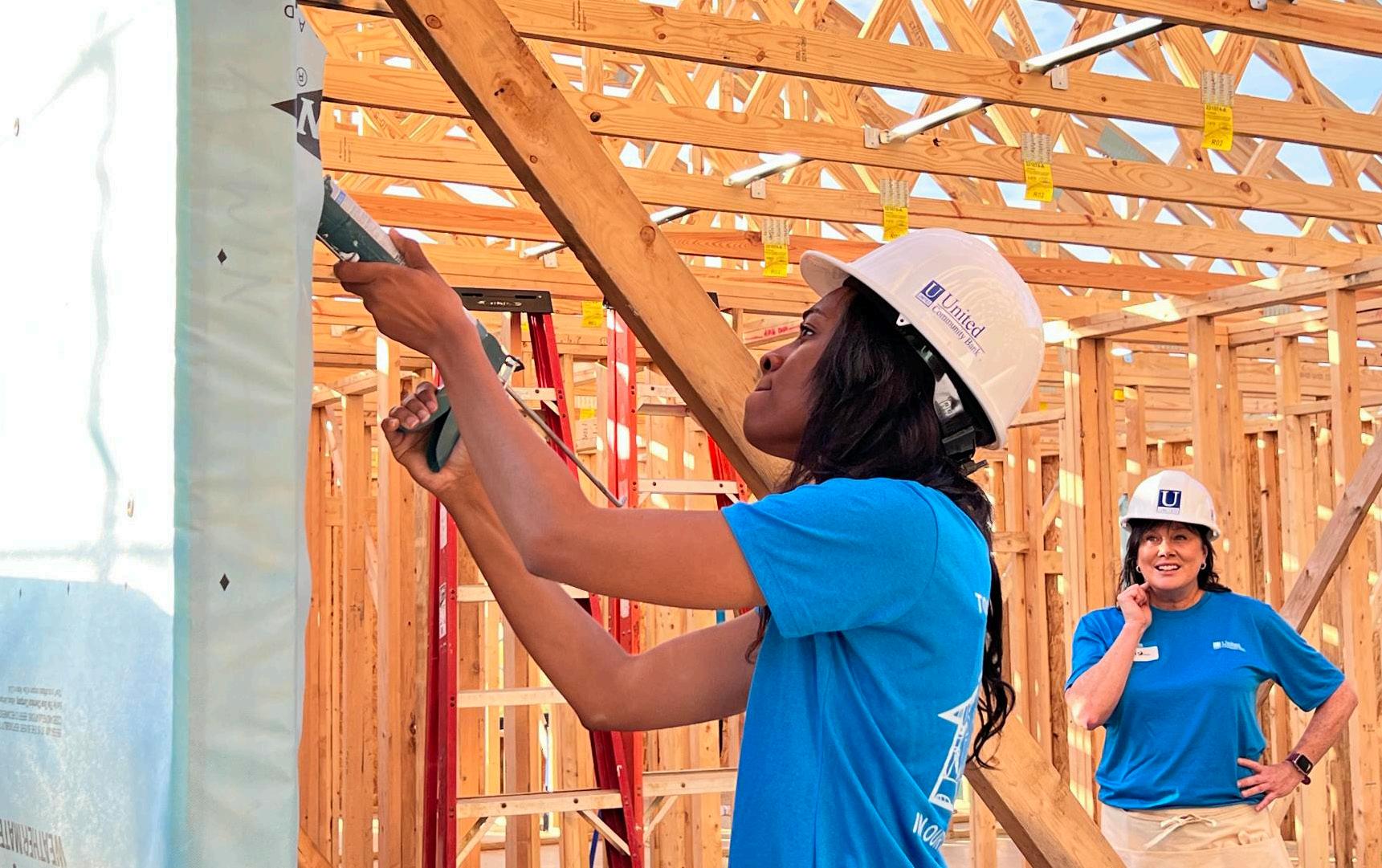
“We’ve been able to participate in Habitat builds across our footprint,” Jackson said. “Habitat for Humanity focuses on the whole person, the whole family, and then, being able to go out on a build and work side-by-side with a future homeowner, that’s been wonderful. For our teams, going out on these builds is engagement, getting to know each other better, working towards a common goal. And it’s been quite impressive. It’s nice to see our bankers using a hammer or painting.”
“More importantly, our bankers are using their expertise by providing financial education on topics such as budgeting, credit cards and credit reports, debt and loans, saving, investing and planning for the future and emergency savings. These are all topics that help families build a more financially secure future.” •
Minimizing security threats is a big deal in banking. But in an increasingly digital world, passwords have become almost an afterthought. We use passwords for everything from credit card accounts to social media. When was the last time you really considered the strength of the passwords you use?

Hackers using trial and error in a brute force attack can instantly gain unauthorized access to individual accounts and organizations’ systems and networks with passwords of six characters or less, according to Hive Systems, a cybersecurity solutions firm.
Cyberattacks against the U.S. financial system are very much in the news, with attacks coming sometimes several times a week. These cyberattacks are the focus of concern for both government and industry, as experts seek ways to identify the perpetrators and stop the attacks.
As a bank customer, it is important to know the facts about these events, so you can interpret the news and decide for yourself how these attacks might affect you and your finances.
• Financial institutions on a regular basis evaluate their security systems to better protect against the threats of cyber-attacks.
• Security system evaluations include: business resilience, authentication, system configuration, security tools, data protection and employee training.
Here is additional information about the cyberattackers, their methods, and their results:
Cyberattacks on banks most often take the form of distributed denial of service attacks (DDOS). These “denial of service” attacks flood a target organization’s website with traffic. Attackers focus on one or two pages—such as the Welcome page or Log In page— hitting it a much as 20 million times a minute. This causes the system to operate slowly as it sorts out the difference between honest requests for service (such as a customer’s), or requests that carry viruses and malware that attempt to cause harm (such as a hacker’s). The purpose of the cyber-attack is to keep the bank’s security system busy, sometimes denying customers online access to their accounts.
Attacks have been known to last up to six hours or more. As the system sorts out the dangerous requests, you might have to wait longer than normal for service. During this time, you may wish to use one of your bank’s many other avenues to access your financial information, such as mobile, ATM, phone, or branch access.
Government and industry experts know that the technology required for such massive Internet hacking cannot be accomplished by a typical basement hacker. Rather, governments, presumably countries unfriendly to the U.S., have the resources to back operations of this sophistication and expense, according to US government experts.
To make sure you are up to date on password security, United offers these recommendations
What should I consider when coming up with a new password?
Length equals strength. For example, which of the following passwords do you think is stronger? A) HJ@&4 or B) ILiketoWatchMovies!
The answer is ‘B.’ A strong password doesn’t have to be complicated and difficult to remember. If you want to make it even stronger, try adding in some special characters: IL!ketoW@tchMovie$!
Most cybersecurity professionals have embraced the term “passphrase” and encourage others to do so as well.
Do I really need to use a different password for everything? Why?
Data breaches do happen. You can mitigate risk by changing up your password for different accounts. This way, if your favorite online shoe store gets hacked, the cyber-criminal will not have access to your social media accounts or your credit card accounts.
What is multi-factor authentication, and why is it important?
Multi-factor authentication requires you to verify your identity two or more times before you’re given access to an account. Most of the time, this will be your account password along with a code that’s sent to your phone or email address.
The chance that someone breaches your password and also has access to your text messages or email is less likely than someone gaining your password alone. For accounts containing information that you don’t want
others to have access to, it’s always a good idea to have that additional layer of protection.
Twelve characters is very long. Do you have any tips on how to remember all my passwords and keep them straight?
Twelve characters is a lot to remember, but that’s why we recommend using a passphrase. You may not be able to remember 4rRhdnos$ljh, but I bet you can remember your dog’s favorite treat. Try something like this: MydogBillLovespe@nutButter!!
You can also consider using a password manager. Password managers store all of your credentials behind one master password that unlocks the software. The downside to a password manager is that if the developer gets
hacked, all of your passwords will be exposed in a single breach. This has happened, but this is extremely rare. Most security experts agree that the benefits outweigh the risks. When you use a password manager, you are more likely to use long complex passwords, and this will improve your overall online security.
How often should I change my password? Do I need to change my digital banking password more often than my Instagram password?
For any account that gives access to your personal financial information or private information that you would not want public, it is a good idea to change your password regularly at least 1(one) time a year. Prioritize updating the passwords on accounts that contain sensitive financial data & email accounts since these contain so much personal information
that can be used against a person, but it is also smart to check in on your social passwords occasionally – you wouldn’t want someone masquerading around the Internet as you.
Is there anything else I should know about password security?
The easiest way to gain access to someone’s password is simply by asking them to give it to you. Reputable businesses will never need you to give your password by email, text, or phone. Be alert. If someone asks for your password, don’t tell them –even if you think you know them.
Be suspicious of any emails you weren’t expecting, and never click the links in these emails. If you aren’t sure about an email, type in a known URL and access the account or website that way. Don’t click the email link until you can be sure that the link is genuine.
Because United places such importance on our customer’s security, the bank has achieved “DMARC Compliance” (a respected industry designation) which is sort of like the Good Housekeeping Seal of Approval for email security. You’ll know when you see our bank’s logo associated with an email in your inbox (e.g. gMail, Yahoo) that is legitimate & secure.
If you receive a call from a business you have worked with in the past and any of the questions they ask seem suspicious, always hang up. Call them back on a number you know is legitimate. •
If you’re looking for Christie Manning, you might find her in United Community Bank-Grand Strand’s main office in Myrtle Beach. Or you might find the bank’s market president for Horry and Georgetown counties in her car traveling among the bank’s six branches in the area.

In any event, the Grand Strand of South Carolina opens up rare opportunities for United, Manning says. The area is exploding in population and has the unique needs of a hospitality- and tourism-based economy.
A native South Carolinian, Manning knows the area well. She grew up in the state’s PeeDee region along the coast and was educated at Wofford College and the University of South Carolina. She began her career with big banks, learning a different side of banking. At one of the larger banks, she worked with Dixon Woodward, now United’s state president for South Carolina/Coastal Georgia. United went on to buy Tidelands Bank, which was acquired by United along with Horry County State Bank. Manning and others made the transition to United in the transaction about six years ago.
“We’ve about tripled in size under United,” Manning says. The Grand Strand bank has six branches, one each in Murrells Inlet, heart of Myrtle Beach, North Myrtle Beach, Little River, Loris, and Conway. If you check the map, you’ll notice northernmost and southernmost branches are 40 to 50 miles apart.
“We did a good job of strategically locating branches,” Manning says. Next up, she is hoping the bank will establish a presence between Murrells Inlet and Mount Pleasant, on the southern edge of the region.
The bank draws on the diversity of its leadership team with long experience in the area. “We’re tapping into their experience with community banking history and the bigger banks. We have diverse backgrounds and experience. We all approach things differently, but we are able to come together,” Manning says.
The Grand Strand team has two dedicated mortgage lenders, but there have been few properties for sale since the deluge of people who moved in during the pandemic, according to Manning. The mortgage business and the wealth management group targeting retirees are opportunities that United hopes to capitalize on.
As for the area’s customer base, it is a bit different from other parts of the state. “Where most banks like seeing commercial and industrial business, on the coast you don’t have a lot of commercial and industrial or large corporations,” Manning explains.
Instead, United-Grand Strand does a lot of business with tourism entities. In the more suburban parts of the area, the customers include many HOAs (homeowners associations). Other customers are retail beachwear stores, entertainment facilities, restaurants, mom-andpop businesses, and convenience stores.
“We had experience and expertise with the people running these businesses,” Manning explains. “United didn’t know about them. But the individuals are known to us, and our opinion counts.” She added that the bank keeps its share of hospitality business in balance with other kinds of businesses.
United’s name is often unknown to the many new residents moving to the Grand Strand, but Manning and her team work to educate them. Existing customers are the best source of referrals. “We do not compete with larger banks but against other community banks,” Manning says. “We can offer anything the bigger banks can offer.”
Manning believes very much in surrounding herself with smart people who set the bank up for success. She has a small commercial lending team that knows the Grand Strand well. United’s Grand Strand portfolio managers and underwriters have a variety of backgrounds and experience that helps meet the needs of a diverse region.
United is known as “The Bank That SERVICE Built,” and Manning says her team puts customer service at the center of its business. “With both branch managers and commercial lenders, you learn buzz words along the way,” she says. “One I have liked the most is ‘trusted adviser.’” She stresses that a trusted adviser does not go into a customer meeting with a preconceived idea of what is best to sell, but instead listens to the customer to find the product that best fits their needs.
On the credit side, the bank is conservative in a good way, vetting agreements to make sure they are good for the bank, Manning says. “But we don’t say, let’s do this. We ask about what’s important to the customer. Is it the interest rate? The payment? The time to pay out? It’s not, this is what works for us. It’s, tell us what you are thinking. We always go in with more than one option.” The bank has a number of loan products in each situation, with the advantages of each explained before a decision is made.
Customer service can be very small things, Manning explains. United has quarterly employee calls with “U Rock” stories about
exemplary service. A teller may go beyond the basic relationship, knowing their customers’ birthdays and the names of their dogs. “It’s taking a vested interest in customers as people that live and work in the same community.”
United-Grand Strand has 55 employees. They serve customers in a variety of communities, as the small cities of Conway and Loris are different from the heart of Myrtle Beach. The employees are spread across the expansive region, representing the bank in varied community organizations and social circles.
Some bank employees are golfers, a major constituency in the Grand Strand. Others play tennis. One senior portfolio manager coaches just about every youth sport.
As for Manning, “I drive a mean beverage cart.”
The divergent interests and involvements benefit United. “They are chasing different customers,” Manning says. “Our folks enjoy each other. We have a congruent team, and teamwork is key.”
With Manning, one thing that never changes is her integrity and leadership style.
“It comes directly from the top,” Manning explains. “My people feel empowered because I feel empowered. The positive energy filters all the way through.” •
MY PEOPLE FEEL EMPOWERED BECAUSE I FEEL EMPOWERED. THE POSITIVE ENERGY FILTERS ALL THE WAY THROUGH.
His aspiration at United Community Bank is to be a leadership development company disguised as a bank.
He says the pace of change in business today means that its success will be driven by its ability to adapt and adjust appropriately.
He believes the better and deeper its leadership skills, the more successful his company will be in navigating ongoing change.
But Lynn Harton also believes, in discussing authentic and transformational forms of leadership – and thinking forward – that there is a huge distinction between being a transformational company versus a technology company as is often the push today.
“At the end of the day, everything turns back into personal,” he says. “Technology is a tool. That doesn’t mean we don’t need to invest in technology. It doesn’t mean that technology is not important. But if we focus on being a technology company, it really loses its purpose and meaning. What does that really mean? What are we trying to do?”
He adds, “What I’d like to do is really think about being a transformational company. We’re United Community Bank. We build communities. That’s what we do. We build communities of customers. We want to connect our customers with each other. We want to connect them with us. We want them to succeed and prosper, invest in their company and, by extension then, their community.”
Harton wants his bank employees to be active in their communities, giving back their time and talent.
“Because if the community improves, then business conditions improve, our lives improve,” he says. “And the most important community is the community of our employees. I want to keep it front-and-center to think ‘What am I doing to really make this a place where people can have a career, not just a job.”
The bank’s emphasis on leadership comes through strongly in two of its programs. The nine-month Leadership Academy offers team members the opportunity to participate in a nine-month deep dive into the business and the customers. In addition, United presents a two-day Senior Leadership Conference each year.
William Marcus, a commercial relationship manager based in Spartanburg, attended the Leadership Academy in 2018, and says it was an “invaluable” experience.
The program helped him learn more about senior leadership and his United teammates,

MEAN? WHAT ARE WE TRYING TO DO?
but also gave him new insights into working with the small business owners who are the bank’s customers.
Marcus learned a “more holistic approach to problem solving,” adding that it was helpful to learn how to “provide solutions outside of the dayto-day tasks.”
Getting a chance to connect with senior leadership members was particularly educational, he said.
“It’s a great program,” Marcus said. “I thought it was beneficial for me in my development.”
And this year’s Senior Leadership Conference, held March 15-16 at the Peace Center in Greenville, offered insights into many aspects of the United Community Bank world.
There were customer panels featuring business owners who bank with United, a discussion on regulatory priorities with Lisa White of the Richmond Fed, a risk panel with bank leaders, and a board of directors panel featuring three member of the United board.
Harton, president, chief executive officer and chairman of the board of United Community Banks, Inc., and chairman and CEO of the company’s subsidiary, Greenville, S.C.-based United Community Bank, has more than 30 years of experience in the banking industry, with expertise in commercial banking, risk management, and turnarounds and change management.
Its parent company, United Community Banks, Inc. (NASDAQ: UCBI), provides a full range of banking, wealth management and mortgage services for consumers and business owners. As of Dec. 31, 2022, United had $24 billion in assets and 192 offices in Florida, Georgia, North Carolina, South Carolina, and Tennessee, along with a national SBA lending franchise and a national equipment lending subsidiary.
The company, known as “The Bank That SERVICE Built,” has been recognized nationally for delivering award-winning service. In 2022, J.D. Power ranked United highest in customer satisfaction with consumer banking in the Southeast, marking eight out of the last nine years United has earned the coveted award.
Forbes recognized United as one of the top ten World’s Best Banks in 2022. Forbes also included United on its 2022 list of the 100 Best Banks in America for the ninth consecutive year. United also received 10 Greenwich Excellence Awards in 2021 for excellence in Small Business Banking and Middle Market Banking, including national awards for Overall Satisfaction and Likelihood to Recommend.
United was also named one of the “Best Banks to Work For” by American Banker in 2022 for the sixth consecutive year based on employee satisfaction. •
A TOOL. THAT DOESN’T MEAN WE DON’T NEED TO INVEST IN TECHNOLOGY. IT DOESN’T MEAN THAT TECHNOLOGY IS NOT IMPORTANT. BUT IF WE FOCUS ON BEING A TECHNOLOGY COMPANY, IT REALLY LOSES ITS PURPOSE AND MEANING. WHAT DOES THAT REALLY
Relationships are important at United Community Bank, but it’s not just about how the bank connects with clients and stakeholders.
The relationships among the people who work there are just as important, and company leaders strive to maintain a culture that emphasizes those connections, said Holly Berry, chief human resources officer at United.
“Our core values are team, truth, trust, and caring, and we hold one another, from the senior leadership team down through the organization, accountable for living those values,” Berry said.
Those core values are woven into the performance management process, tied to employee reviews, Berry said.
In annual performance reviews, individuals are evaluated on four key areas: demonstrating core
values; exhibiting job proficiency; displaying ownership and accountability; and building relationships with clients, coworkers, and business partners.
“Those four areas are the heart of who we are on our quest to become a legendary bank, making a difference in the lives of our employees and communities we serve,” Berry said.
In addition, employees are encouraged to disclose when they’ve made a mistake.
“We want to embrace that telling the truth and that bad news should travel fast, and we want managers to be open to hearing it so that we can course-correct, learn from it, and move on,” Berry said.
While United wants team members to work together well, the company also wants them to have fun together.
Managers are encouraged to put on events for their teams throughout the year “so they’re more intimate in connecting small groups together,” Berry said.
Those events – which have ranged from book clubs to holiday celebrations to “smash-it events” where employees don protective eyewear and destroy old office equipment with baseball bats – can bring teammates together in ways that day-to-day duties don’t.
There’s also an annual employee appreciation event in which each manager is given a budget to plan a celebration for their team. And the money can’t be used to give each team member a gift card; it

has to be “experiential,” a fun activity to help employees connect and to show appreciation for their dedication, commitment, and contribution to the company’s success
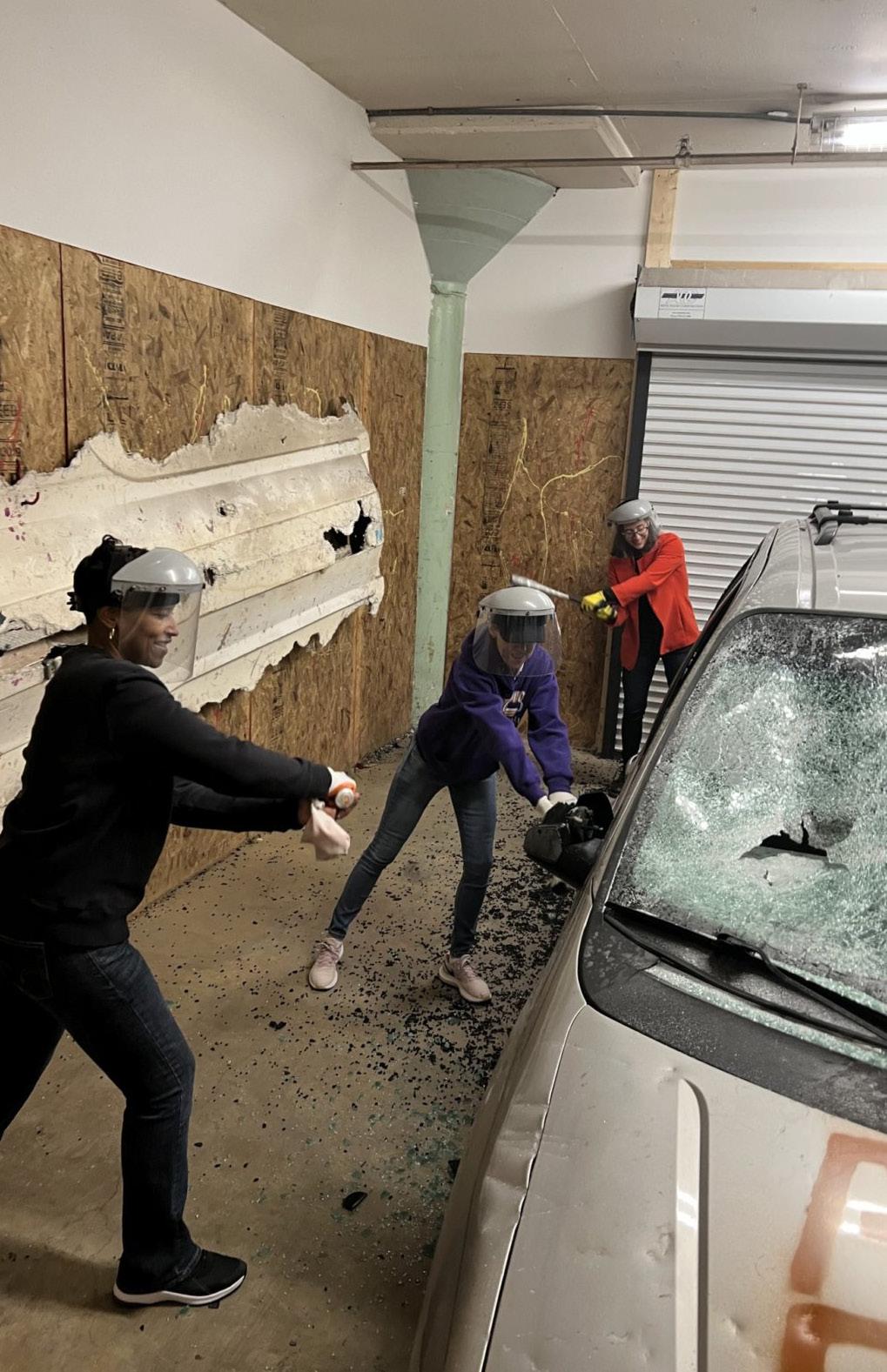
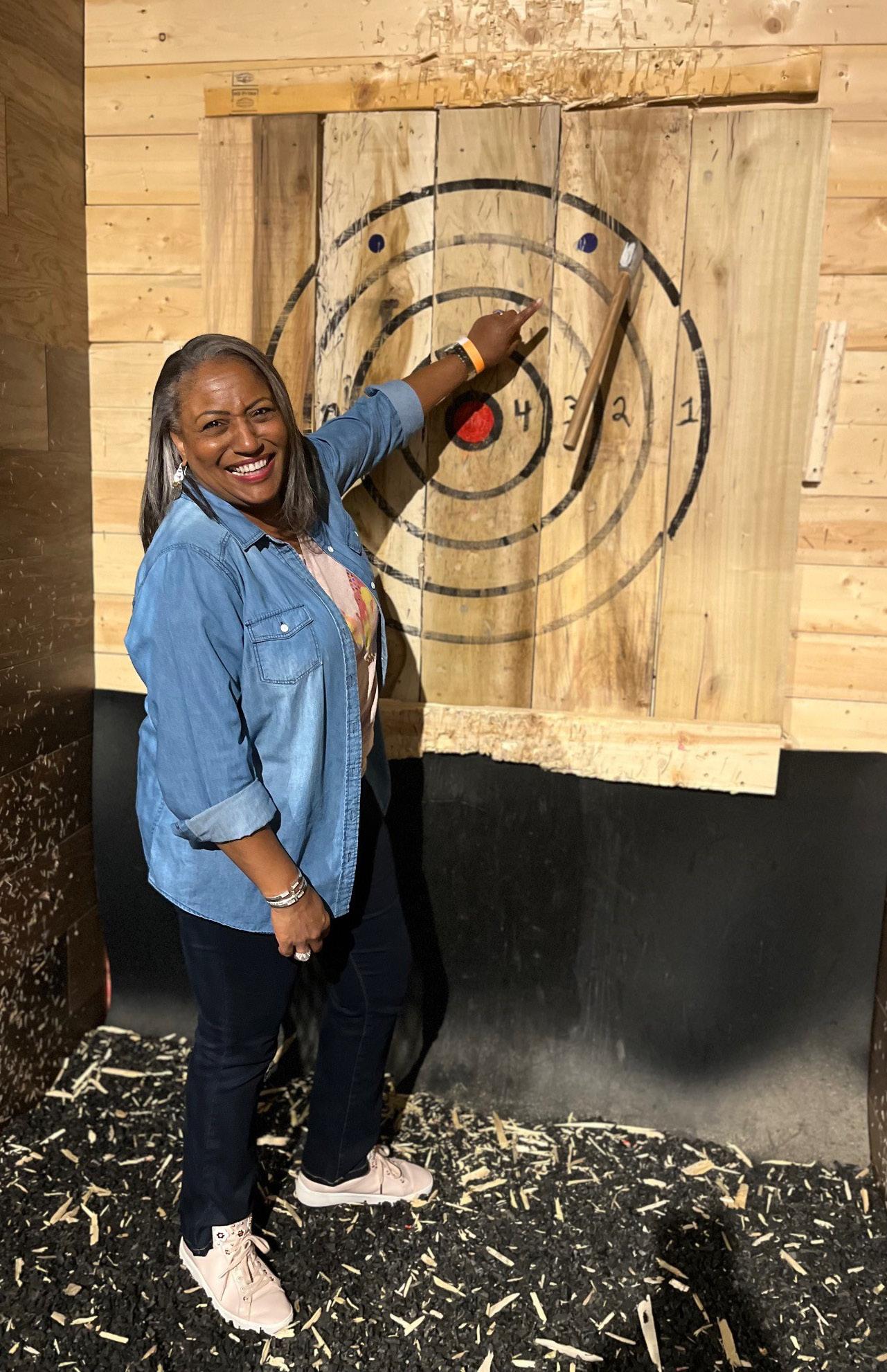
An engaged employee is a happy and productive one, Berry said, and United has more than anecdotal evidence to back up that assertion.
Employee engagement surveys help United determine the areas in which the company is most successful, as well as the areas for improvement. The findings from those surveys are shared with employees and used to build recommendations and plans for positive change.
The company wants a teammate to fit in well from the beginning, so part of the hiring process includes an assessment called Predictive Index that assigns candidates with positive profiles based on their personality
traits, and the company works to align employees with jobs that fit those profiles.
And when an employee resigns, the bank also analyzes the reasons behind the resignation. If there are trends, the company works to address the concerns and build action plans, Berry said.
“We recognize that employees can have a bad day, and we want to support employees, but one of the things I’ve noticed that’s different than four or five of the other companies that I’ve worked for is that we have more good days than bad ones, and we are fiercely protective of that,” she said.
“We don’t want the bad apples to bring the culture down. … We give people coaching and resources to fit with our culture because that’s very important for us to preserve and protect.” •
Community is at the heart of United Community Bank, and that thread ran through every session of the company’s 2023 Senior Leadership Conference, held March 15-16 at the Peace Center in Greenville.
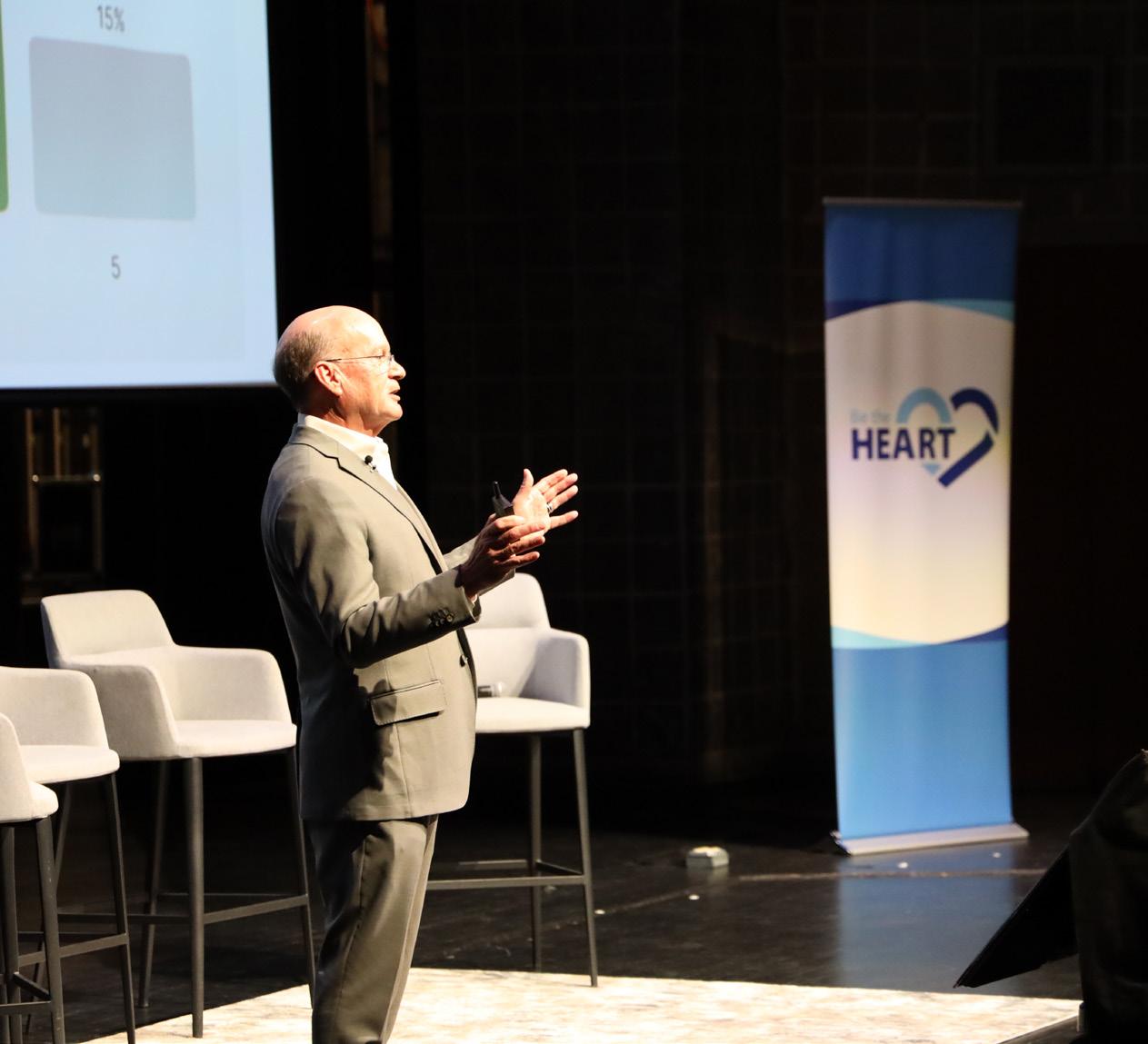
In the introductory session, Lynn Harton, United’s president and CEO, told team members from around United’s footprint that there is power in teamwork.
“All of us together are smarter than any one of us,” Harton said.
While America’s banking system is undergoing a transformation – a “climate change” due to everything from the rise of cryptocurrency to bank failures to fluctuations in mortgage rates –United’s mission remains the same.
“Our aspiration is to build a legendary bank,” Harton said.
Focusing on the customers who put their trust in United is one important way to build on the bank’s goals, and that topic was emphasized
during a panel discussion featuring three clients of the bank: Chad Odom, CEO of Encore Container; Thomas Carroll, president of Homrich Berg; and Joe Gass, president and CEO of Heritage Sign and Displays.
For Carroll, whose company has been in business for nearly 35 years, service is one of United’s standout qualities. “I was looking for a relationship” when his company decided to switch banks.
Carroll said the company’s “very quick response” to customers’ questions makes it a standout among banks.
United’s hallmark of “great service delivered by great people” will win out over larger banks in the long term because, Carroll said, “that’s all that matters.”
For Odom, United’s approach is a good fit for his company. “United Community Bank is a large bank, but it operates on a community level.”
Another part of the conference was a risk panel featuring CFO Jefferson Harralson, Chief Risk Officer Rob Edwards, and CIO Mark Terry.
While United has been growing strongly in recent years – reaching the $24 billion threshold at the end of 2022 – its profile and the way outsiders see the bank change along with the growth, Edwards said.
“There’s a risk that we see ourselves as small,” Edwards said. “Being small and thinking small is the heart of who we are. As banks increase in size, their expectations increase.”
As banks increase in size, they often make mistakes, Edwards said, including consolidating credit officers in large cities away from the communities that individual branches serve. The distance between bankers and customers does not serve the company or the people.
That’s not how United does business, he said, because “that’s the opposite of what needs to happen.”
Building personal relationships is an important part of the bank’s culture, Edwards said.


The conference ended with the unveiling of United’s new logo, the product of much research and feedback. The new logo features the words “United Community,” with a stylized symbol that connects the “U” and the “C.”
“We wanted to build on our legacy” as a community-based bank, said Abraham Cox, United’s chief marketing officer.
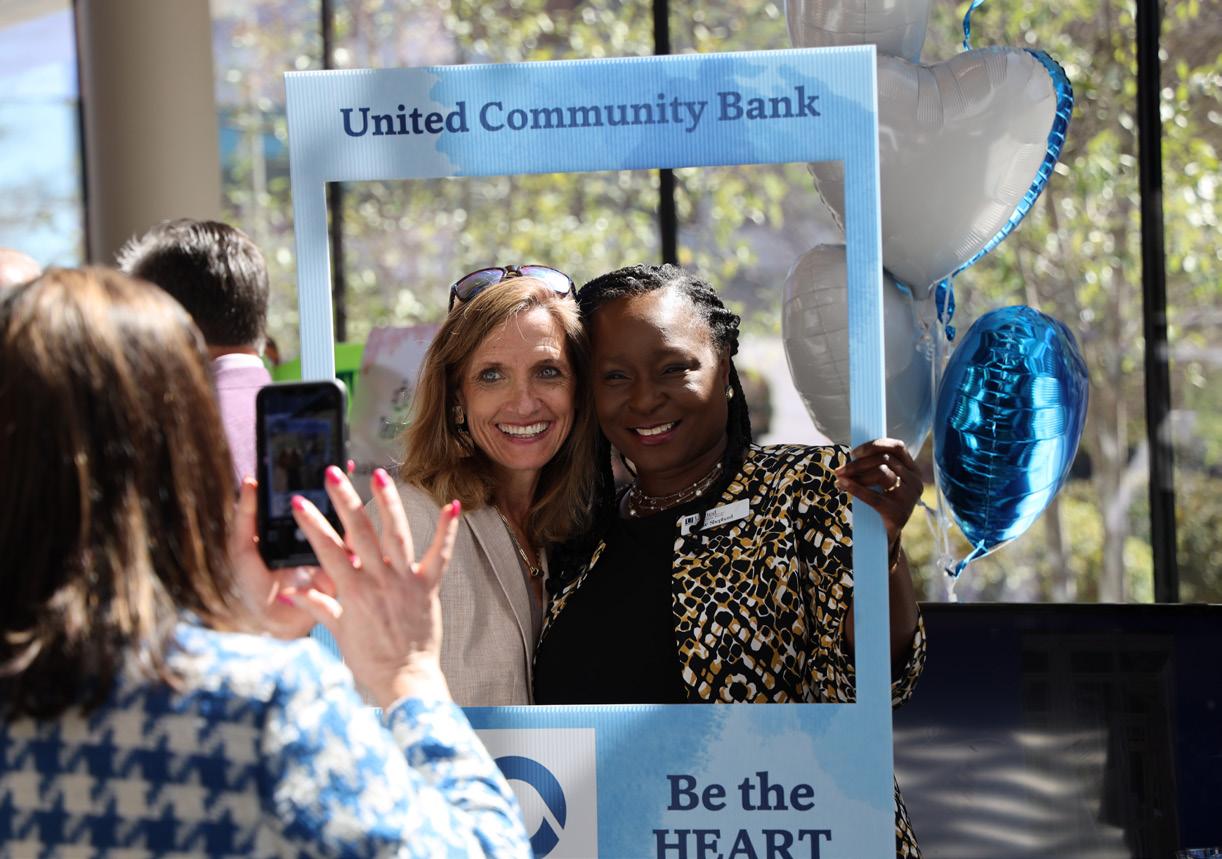
“We’re united together to serve our customers and build our community,” Cox said, “and we wanted a distinct and distinguishable mark.”
The new logo was revealed to bank employees in late March, and the rollout will take place across the bank’s footprint in phases over the coming months, with a complete changeover in all branches by summer 2024. •
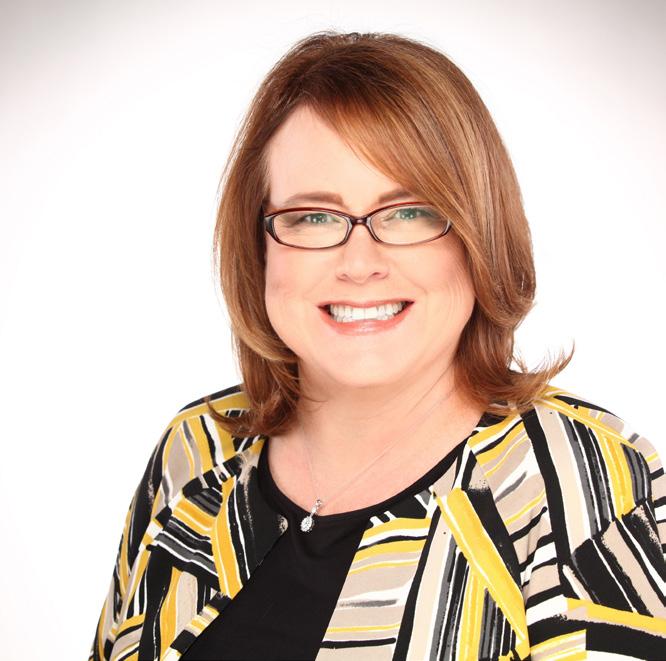 By Licia Jackson
By Licia Jackson
Michelle Brewer, United Community Bank’s Fair and Responsible Banking Officer, has a lifelong passion for making a difference in the community. “I have a deep respect for all human life,” she says. “I believe everyone—regardless of socioeconomic background—should have the ability to be financially stable and to build financial wealth. That’s what builds strong communities.”
In her role, Brewer is tasked with making sure the bank lives up to its commitment to fair and responsible banking across its entire footprint. “Providing fair access to financial institutions is an important aspect of every community,” she says.
Brewer has been with the bank for 27 years as a legacy employee of Palmetto Bank, which United acquired in 2015. She now works at United’s headquarters in Greenville, South Carolina, a place she has called home for the past 42 years. She began her compliance career with Palmetto, which was headquartered in nearby Laurens County.
As a fair and responsible banking officer, Brewer manages the bank’s compliance program to address the applicable regulatory risks in United’s business activities. In this role, she ensures that United is serving the entire community and following federal regulations
to prevent unfair, deceptive, or abusive banking practices. For example, under the Community Reinvestment Act (CRA), banks must meet the credit needs of the communities in which they do business, including for low- and moderateincome neighborhoods.
Brewer manages a team that is responsible for gathering and reporting data on all 44 markets that the bank serves to determine whether United is meeting the community’s banking needs, assess how the bank is investing in the community through donations, and report on where the bank’s employees are volunteering. The Fair and Responsible Banking team gathers and analyzes data to ensure it is accurate and reliable before providing the data to federal agencies, which rates the bank’s performance. United’s most recent CRA performance evaluation earned Satisfactory ratings.
The challenge, she says, is developing products and services that people of all socioeconomic backgrounds can use and providing financial access to the entire community. For example, United offers mortgage products that are tailored to the needs of low- to moderateincome people, and United Essential Banking is an FDIC-approved Bank On product that offers checking accounts with low fees and no minimum balance to help people who are unbanked or underbanked. United also gives customers the ability to open accounts or apply for loans online, creating access for people who might not be able to do their banking during
regular business hours. “We also have interactive teller machines with an actual teller on screen that operates for longer hours than the bank’s brick-and-mortar branches,” she says.
Brewer also works with a variety of business units to offer compliance advice. For example, she teaches employees outside of her department about the requirements of fair and responsible banking, and the bank has a task force that focuses on fair and responsible banking to assess United’s progress. Her team also monitors regulatory changes to ensure the bank is complying with all of the latest rules for financial institutions.
However, Brewer says her job is about much more than compliance. “Volunteer work is a core aspect of what I do,” she says, “and United employees are engaged with and committed to volunteering in their local communities.” In each state, employees help build Habitat for Humanity homes, and the United Community Bank Foundation donates funds to help meet community needs. “At the end of the day, we are ‘The Bank That Service Built.’ It’s in our roots and our culture to be committed to the community,” she says. “The beauty of the United team is that everyone, from the top down, is committed to the communities we serve.” She also appreciates the support that her team gets from United’s top leadership. “They are phenomenal, and it makes our job so much easier,” Brewer says.
As for her own volunteer work, Brewer is passionate about teaching financial literacy. “We are the financial experts within our community, and we can use those skills to serve others and help people become more financially savvy.” Her focus is on teaching young people, who might not always receive financial education in school. “As a banker, I have gifts to bring to the table,” she says. “I especially love making connections with young people.” She also mentors youth in other ways, including spending two weekends a year serving on a retreat that helps highschool students focus on their spiritual journeys.
She says her life is guided by the principles of the Four Agreements by Don Miguel Ruiz:
• Be impeccable with your word.
• Don’t take anything personally.
• Don’t make assumptions.
• Always do your best. Brewer has held a variety of positions throughout her three decades in the banking profession. And now she believes, “I’m right where I’m supposed to be. I feel like I’m making a difference.” •
THE BEAUTY OF THE UNITED TEAM IS THAT EVERYONE, FROM THE TOP DOWN, IS COMMITTED TO THE COMMUNITIES WE SERVE.
That’s what management handed Philip Rich in the early days of Wealth Management services at one of United Community Bank’s predecessor banks 16 years ago.
“They were very open to ideas on building an investment process, as long as we kept in view the client-centered values of the bank. There was no pressure to use investments managed by a subsidiary, no instruction to favor firms doing reciprocal business with our bank – just a mandate to serve our clients to the very best of our abilities, keeping their interests above all others,” recalls Rich, United’s chief investment officer.
Even to somebody who had been in the business for decades, this was a breath of fresh air.
“So many organizations have obligations to use in-house managers, investment subsidiaries, or other related parties, it is frequently difficult operate in the exclusive best interest of the client in a large bank environment,” he said.
Investment management at United is subject to considerable regulatory and supervisory oversight, but the objective of helping customers realize their financial goals remains at the center of all the bank’s aspirations for this line of business.
In his role as CIO, Rich leads a team that develops and communicates investment strategies and policies, oversees the investment process, develops portfolio allocations based on clients’ express needs and performs due diligence on outside managers.
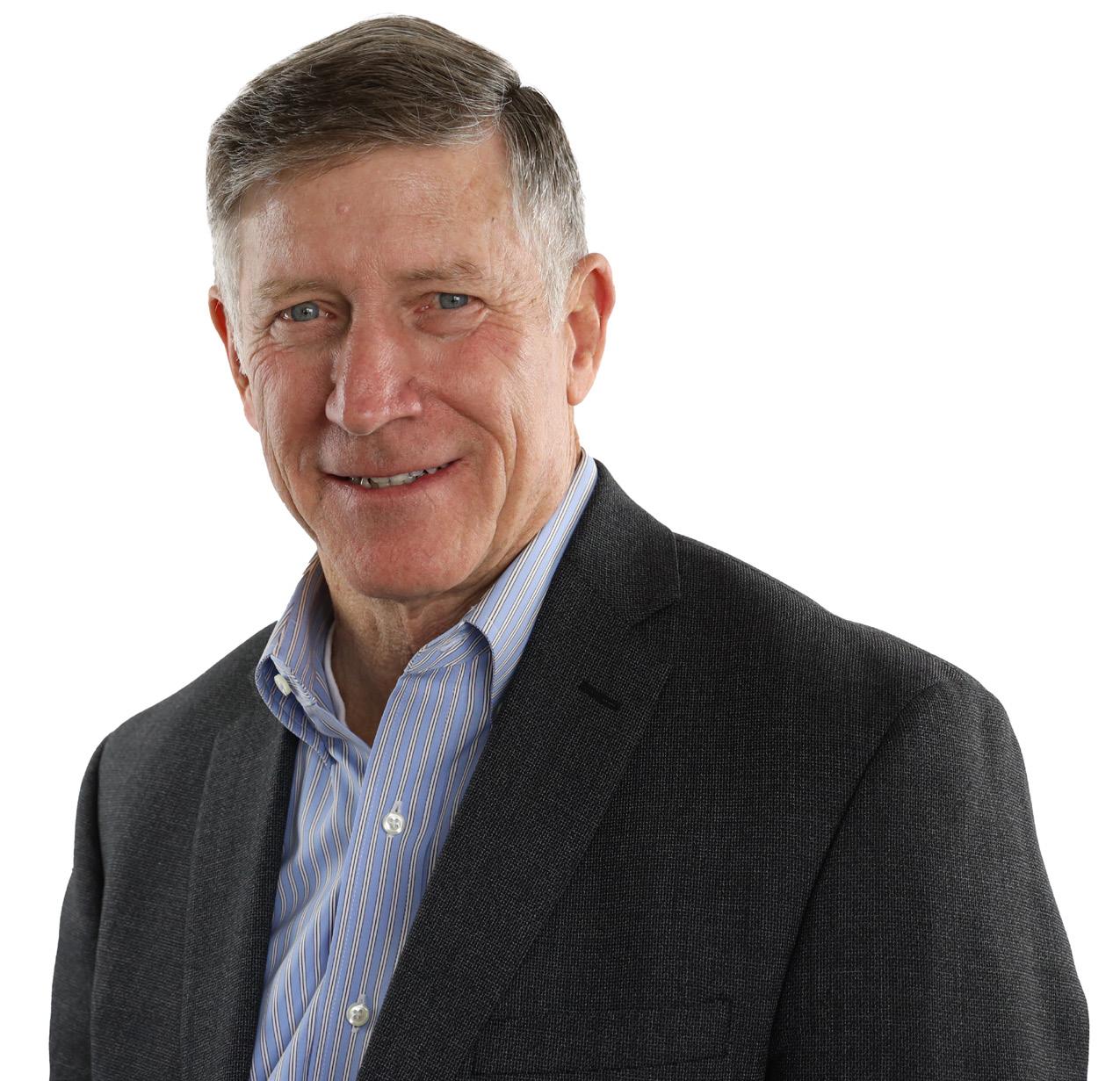
Because this process is not beholden to any particular investment firm or provider, virtually the entire universe of investment managers and vehicles is available to achieve a client’s objectives at a given moment. Naturally, that
puts a significant burden on the selection of strong managers, their combination into efficient portfolios and ongoing due diligence on their performance.
“That’s why the team is so important. There are thousands of money managers out there, and the best at building muni bond portfolios rarely works for the same firm as the best for smallcap equities. Our work is a constant process of research, discovery, and due diligence,” says Rich.
“We like to think of ourselves as agents for the buyers, not the sellers – and our sole source of revenue is the fees paid to us by our clients. We have no divided loyalties.”
However, the process still begins with a blank piece of paper, even an entire legal pad.
“In the beginning, we used to bemoan our lack of marketing materials, booklets and pamphlets, but in reviewing those materials from the competition we noticed they were always
about how great the firm is. Lacking in some of those materials, we were forced to build presentations around each client: their needs, their families, their aspirations.”
Typically, Rich and his team will arrive at the first meeting with a prospect, armed with a legal pad.
“We are there to listen and to learn. Only then can we build compelling portfolios, designed to meet our clients’ needs.”
That process is never quick and easy, it requires an investment of time and understanding before it can be translated into a successful portfolio strategy. “Even now that we receive good support in the marketing area, we realize it is a strength to keep the client at the center of the process.”
A key element of that process also typically involves financial planning.
“Gathering all the relevant financial information in one place, creating a family budget and projecting expected returns and expenditures into the future is an exercise that makes planning concrete and manageable. It draws a detailed financial picture, both present and future of a family’s assets, needs and priorities.”
Without such a plan, Rich doubts he could build a fully effective portfolio.
Once a proposed portfolio is developed for a client, a document detailing all of the costs and fees associated with the proposal is delivered and reviewed prior to any implementation.
“It is remarkable how opaque the cost of investing remains, even today,” says Rich. “We want our clients to know what they own, why they own it, and what it costs.”
The process also involves finding cost-effective solutions for clients’ investment needs. “Because we receive no compensation from any external investment firms, we have no reason not to manage the cost of investing as part of the portfolio construction process. If two managers are very close on measures of risk and return, and both have similar strategies, we will always gravitate toward the lower-cost solution.”
Rich never gets far in his discussions without talking about his team.
“I am very fortunate to work with a group of really smart, experienced, and dedicated people. This is a team that genuinely likes working together and has a remarkably uniform view of their work mission. They are a pleasure to work with. And without our bankers, we wouldn’t have prospects. Nothing can replace their knowledge of our clients’ businesses, their families, and their overall financial situation. Without this teamwork, none of us could be effective in our roles.”
Rich has a total of 37 years’ experience in the trust and investment services business. He received a bachelor’s degree from Rollins College and a master’s in business administration from the Crummer Graduate School of Business.
Prior to joining United, Rich served in various management positions at SunTrust. His first role after receiving his MBA was managing workouts for defaulted municipal securities in SunTrust’s Corporate Trust division.
“Regrettably, most of us have met or heard from people in this business who display a degree of arrogance. But if you participate in markets and try to understand them, I think they teach us humility. Furthermore, our business brings us into contact with an extraordinary variety of successful people. I am constantly amazed and the many ways this country allows people to find success, provide for their families, and give back to their communities. Those are among the many rewards of this job.” •
WE WANT OUR CLIENTS TO KNOW WHAT THEY OWN, WHY THEY OWN IT, AND WHAT IT COSTS.
 By David Dykes
By David Dykes
Lynn Harton is president, chief executive officer, and chairman of the board of United Community Banks, Inc. and is chairman and CEO of the company’s subsidiary, Greenville, South Carolina-based United Community Bank. He has more than 30 years of experience in the banking industry, with expertise in commercial banking, risk management, and turnarounds and change management.
Prior to joining United Community Banks in 2012, Harton was executive vice president and head of Commercial Banking-South for TD Bank, NA. Prior to joining TD Bank, Harton was president and CEO at The South Financial Group (which was sold to TD Bank). He also has held various executive positions at Regions Financial Corporation, Union Planters Corporation, and BB&T.
Harton earned his bachelor’s degree from Wake Forest University and has participated in various executive programs at Duke University, Wharton, Columbia, Northwestern, University of North Carolina, and University of South Carolina.
He believes in a constant theme of capitalism, which he thinks is simply the freedom to start a business – or not.
Ellen Brown, an attorney, founder, and chairman of the Public Banking Institute and author of “The Public Bank Solution,” wrote once in The New York Times that public banks are essential to capitalism.
“Banking, money, and credit are not market goods but are economic infrastructure, just as roads and bridges are physical infrastructure,” she wrote. “By providing inexpensive, accessible financing to the free enterprise sector of the economy, public banks make commerce more vital and stable.”
In an interview, Harton explained his views on the importance of capitalism in United’s mission, building relationships, and how healthy banks support and help create healthy communities. Here are excerpts from that conversation:
Q. You want to stress this theme of capitalism. Why?
Harton: Because capitalism works. For some reason, people have equated capitalism with some outcomes that they don’t like. I don’t agree that’s what capitalism is. What is capitalism? To me, it’s free enterprise. It’s mobility. It’s the rule of law. It’s ability to dream big. It’s ability to do whatever you want to do. This is where people came when they had nothing to create something. My grandfather was a sharecropper – never owned a home. My father was first to go to college. He said the only thing his father ever gave him – he said, “When I went to college, he gave me $20 and he gave me a car that he paid $5 and a pig for. And I painted it with a brush.”
He worked hard, worked his way through school, worked at night, had two jobs when he got out, and ultimately built one of the most successful Allstate agencies in five states. Capitalism is what enables that.
Q. Partnerships fit one of the bank’s core values of building relationships. How do customers benefit from the bank’s skills and lessons learned with the backdrop of capitalism?
Harton: We see so many different businesses on different growth trajectories, different strategies. That’s the beauty of this job. You’re not stuck in one business, one industry, one niche. You get to see all these things and you get to see what works and what doesn’t. How do you manage through growing too fast? How do you watch out on that? What’s the value of bringing in a partner versus doing it yourself, particularly when you’re in a growth mode?
We may not know the details of your business in the sense of where would you buy your supplies from, etc. But we know how important margin is. We know how important managing your receivables is. We know what your operating cycle is and how you finance that. We know what it looks like if you have too much debt, and what kind of things you’re putting yourself at risk for, so we can bring that risk perspective to a client.
There are many times clients are looking to the bank to essentially validate a decision (to
buy a company or expand). They’ve done their homework. They believe it’s a good idea. But they want their advisers – their attorney, their accountant, and their banker to validate, “Have I thought about everything? Is there any risk I haven’t thought about? Is there any risk I haven’t mitigated?”
If we think of ourselves as just an order taker: “OK, we’ll do it this way,” we are doing the customer a disservice. We would rather be a partner that says “Have you thought about this? Here’s what we’ve seen in other places. I wouldn’t advise doing it that way.”
A partner is not going to just say “yes” all the time. Wouldn’t be a very good partner if they did.
Q. How do you fail at capitalism to learn those lessons?
Harton: Failure is part of capitalism in terms of the concept as a whole. What I mean by that is you have to let the good ideas rise to the top, and bad ideas go away. To me, that’s what I’d say is failure. You want to fail fast, and fail small. Capitalism is the freedom to try new things.
I’ll give you an example from us. If you look at health-care lending – health care is a huge part of the economy. We started it in Nashville several years ago, before we had an office in Nashville, which is the health-care capital of the world. What we wanted to build was really local relationships with local businesses that were tied into the health-care industry. What we ended up with was a bunch of just large, syndicated credits, with no real relationship value.
We tried it. We failed at it in the sense that it didn’t do what we thought it would do, and we sold it. (We) learned. Fail fast, fail small, fail quick, move on.
The vast majority of my super successful clients … are doing something today that they didn’t start out doing. They get into a business, and they think that they’re going to make their money in this one area, and then all of a sudden they pick up a client that asks them to do something a little different. And they do that, it’s successful and they’re like ‘Oh, is there another client that wants to do something like that?’ And they end up turning the business in the vein of where they ultimately become the most successful.
Thanks Lynn. •
Not all successful entrepreneurs start off with grand plans. Take Donna Jensen, for example.
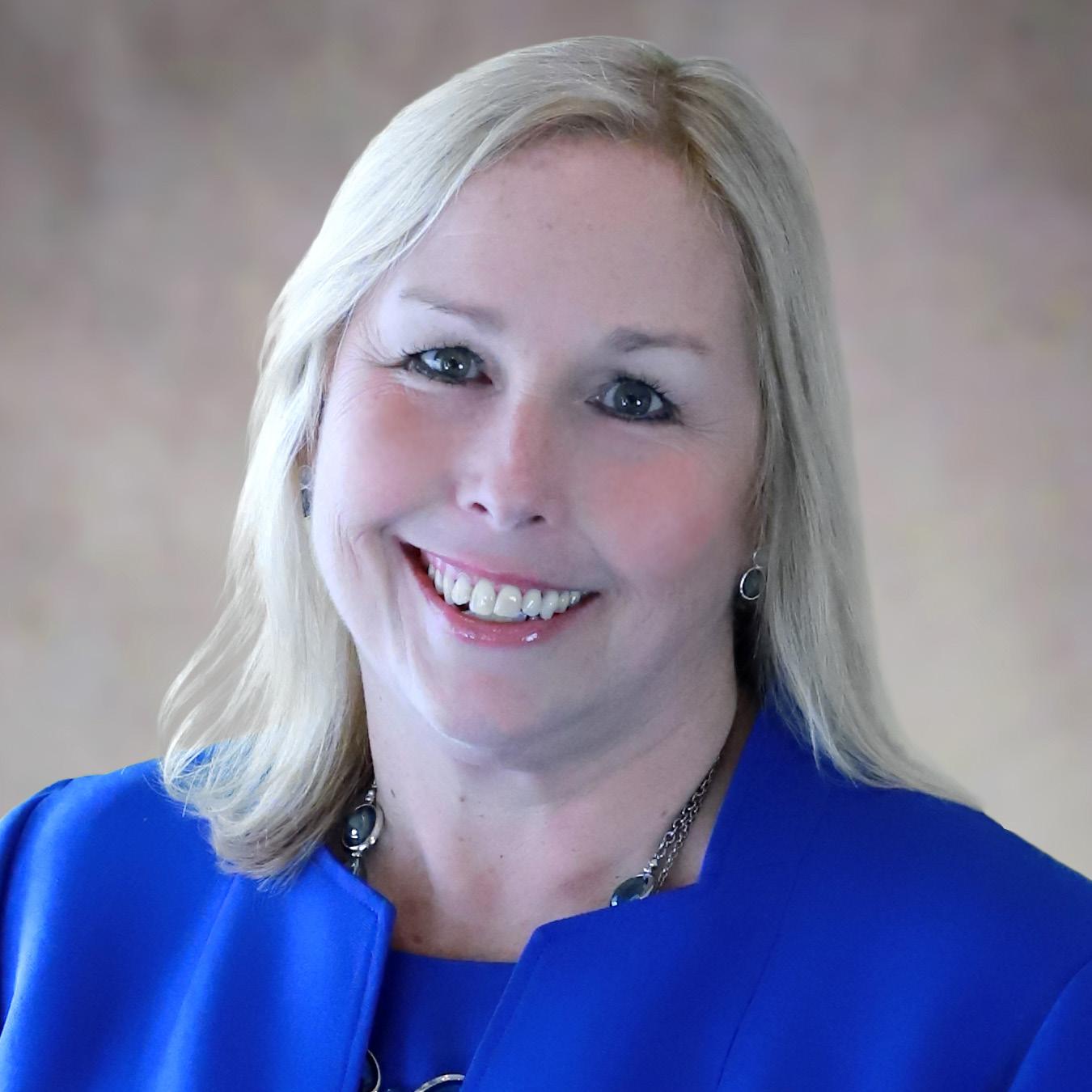
Jensen, founder and owner of The Learning Station Child Development Center in Myrtle Beach, began her journey fresh out of college, where she had studied early childhood education. The New Jersey woman’s young family relocated to Myrtle Beach in 1987, and Jensen began working at a child-care center. But she quickly became dissatisfied.
Jensen felt she could do better.
“I just was not happy with the environment I was in,” she explained in a recent interview. “So I ended up starting a home child-care center, and for about eight or nine years I cared for children in my home.”
Jensen’s next opportunity to grow in her field came from an unlikely source.
“The church that we were a part of purchased a former school building and built a sanctuary, and they asked me to found a program, a child-care center at their location,” she recalled. She served as director of the St. James Child Development Center for the better part of a decade, before “I decided to go out on my own.”
That decision led to the opening of the first The Learning Station, in Myrtle Beach.
“We started off with one location,” she said. “We renovated an old boot store, which was like putting Band-Aids on something that needed open-heart surgery. We quickly, quickly outgrew that location.”
| By John C. StevensonTwenty years later, The Learning Station has grown to include three locations around Horry County with a total enrollment of more than 400 students. Among those are Jensen’s own grandchildren, according to The Learning Station’s website.
The first step for The Learning Station was to find a location that would be more practical than the former boot store. Fortunately for Jensen, a building in Conway, which had also been a child-care center before it closed its doors, became available, and she quickly signed a lease and moved her business to the other side of the Inland Waterway. As her business continued to grow, she was able to partner with investors to lease and upfit a space in Myrtle Beach to open her second center.
With the business thriving, Jensen partnered with United Community Bank to purchase both buildings she had been leasing. In July of 2022, in the midst of purchasing both properties, another center became available that was near her Myrtle Beach center. It just made sense for this to become Jensen’s third center and with the help of United, she was able to make that happen. “In the last two years we’ve expanded and grown tremendously,” she said.
Jensen is quick to point out the assistance she has received from United as she has worked to expand her vision for The Learning Station.

“It’s been exciting working with Jennifer Tyler at the bank – she’s been super helpful and done a lot of great work for us,” Jensen said. “She has amazing customer service. She is great at following up and working with the attorneys and just following through to get all those requirements met. She’s helped by just walking us through the processes and making sure we got the best terms we could get.”
In fact, Jensen adds, Tyler “was the reason we chose to go to United.”
Ironically, Jensen said most of her commercial banking is currently with a large, national bank, but she sees that changing in the not-too-distant future.
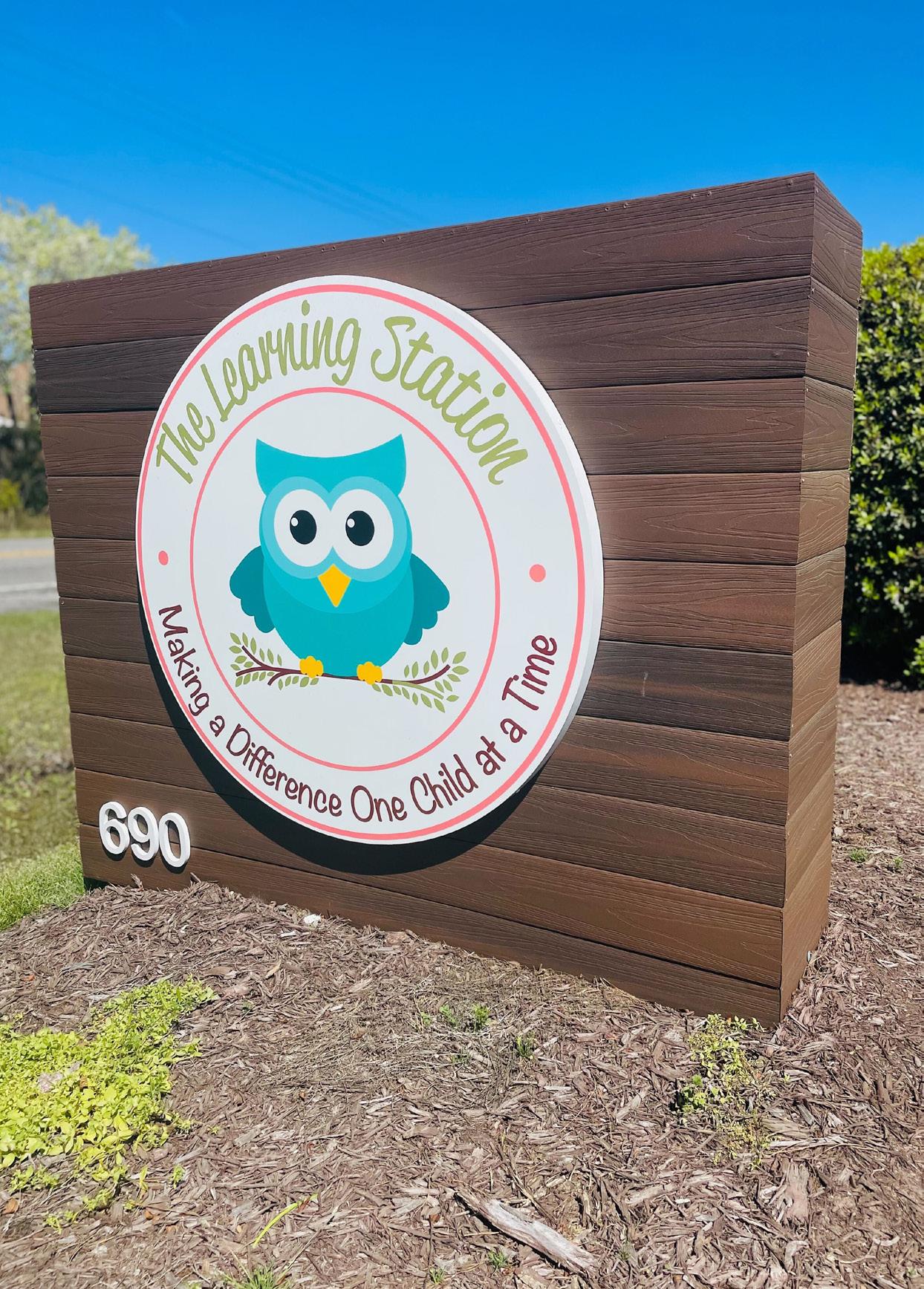
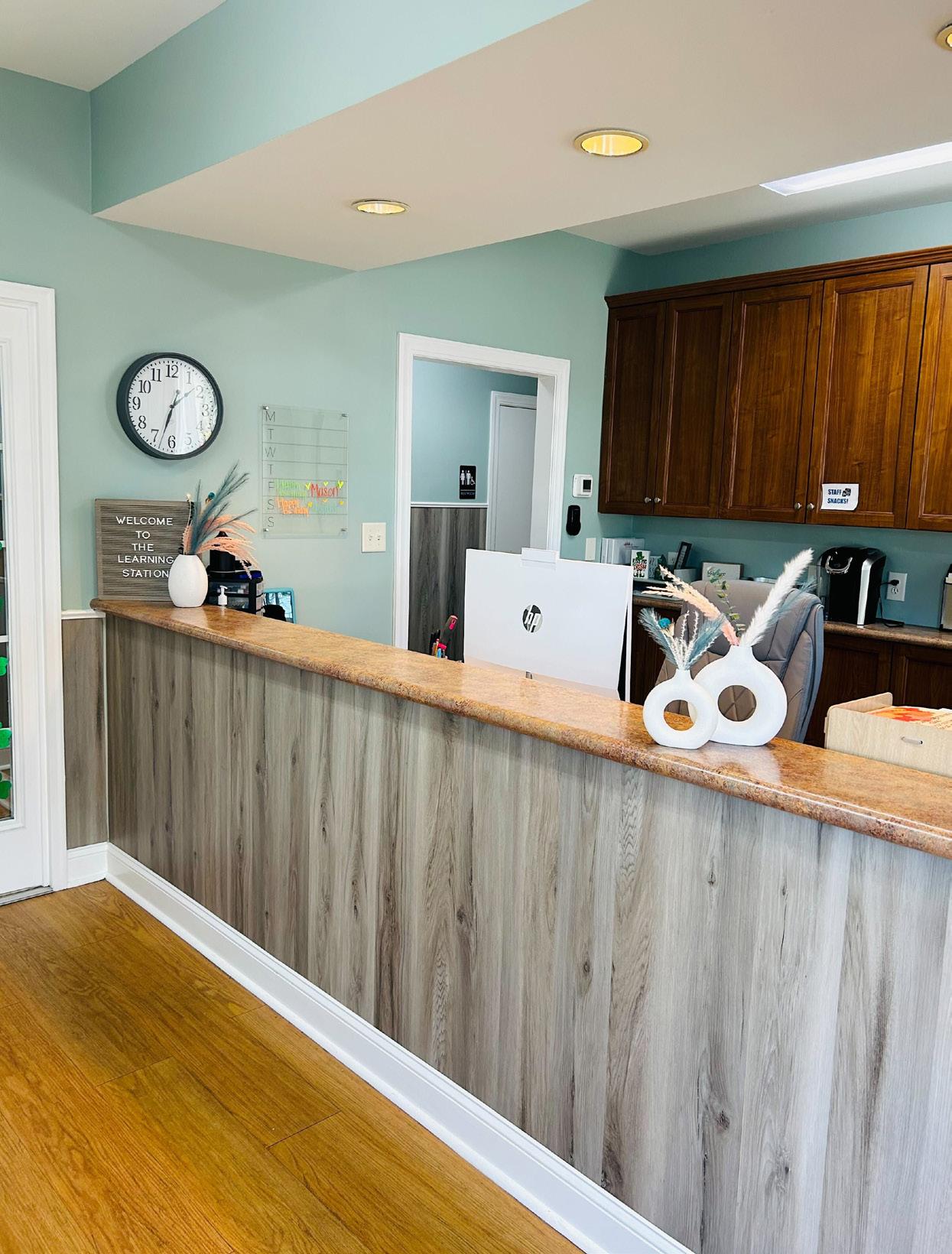
“I did not want to go through them for my loans,” she offered. “I like having a personal relationship with a smaller, community bank, so we’re in the process of trying to get all our stuff switched over, because Jennifer and United have given us really great customer service.”
Looking ahead, Jensen isn’t planning to slow down anytime soon. She’s currently looking at potential sites for a fourth location.
“We have grown quickly over the last two years. It’s been exciting, and Jennifer has done a lot to carry it all through,” Jensen reflected. •
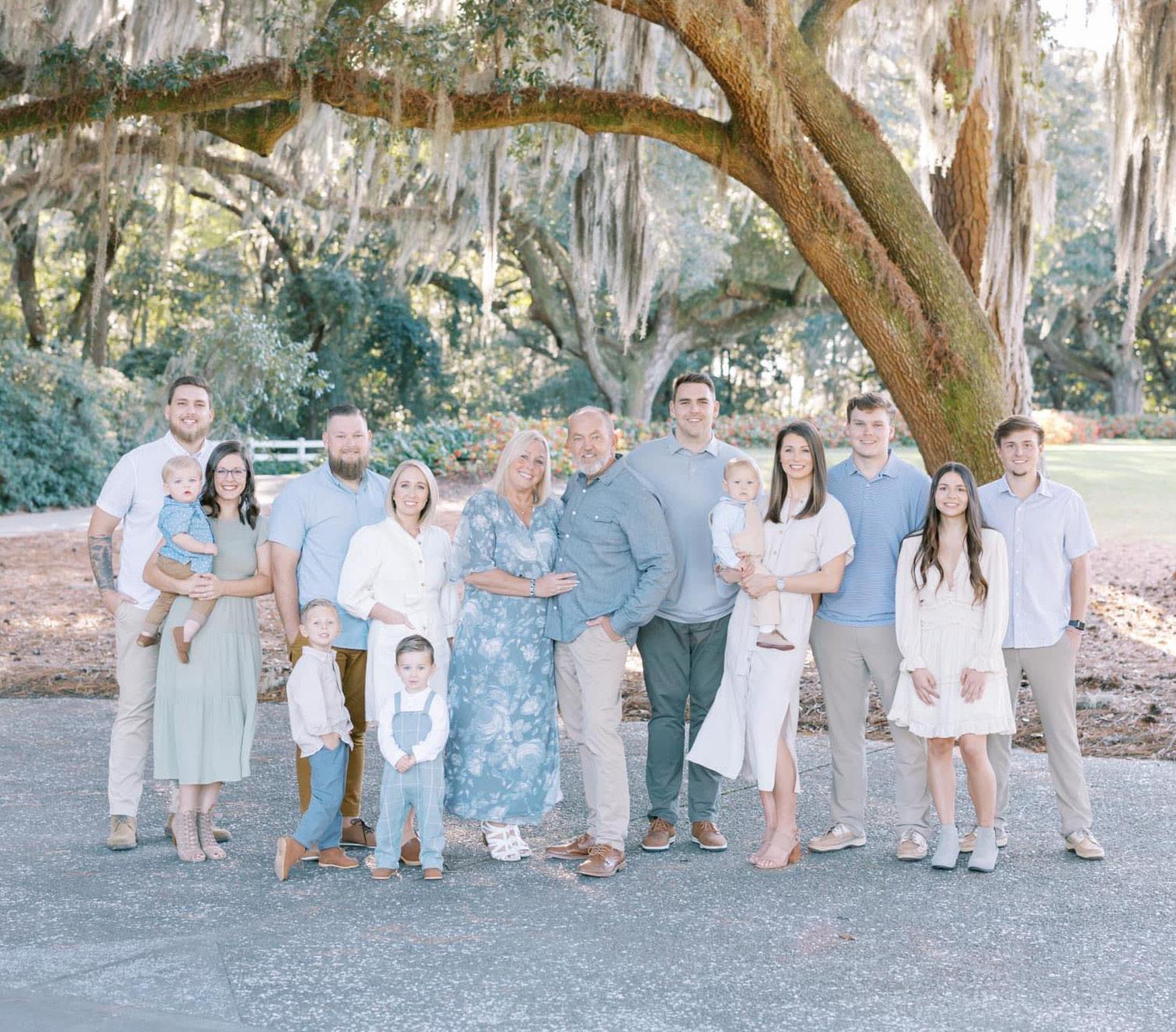 Photos provided by The Learning Station / Donna Jensen
Photos provided by The Learning Station / Donna Jensen
WE HAVE GROWN QUICKLY OVER THE LAST TWO YEARS. IT’S BEEN EXCITING


